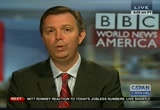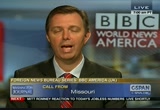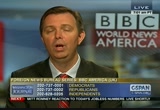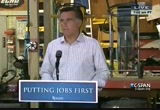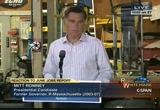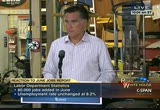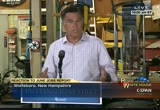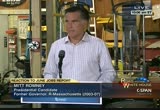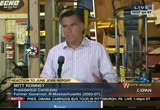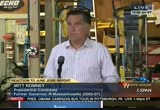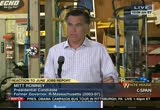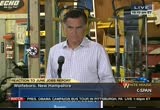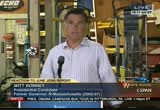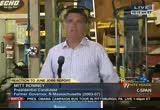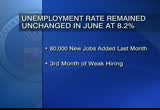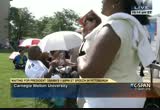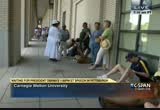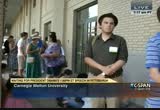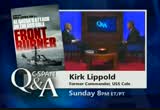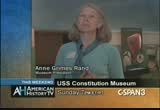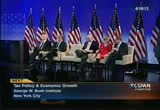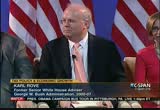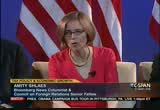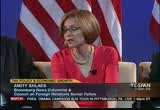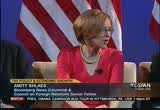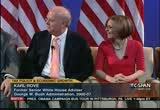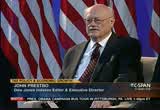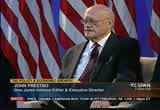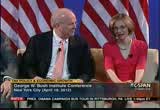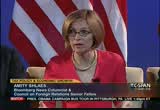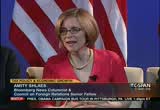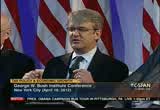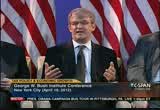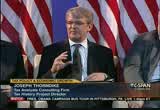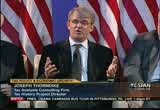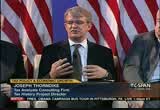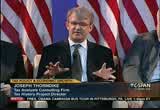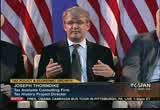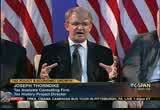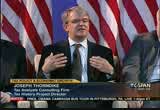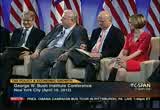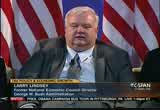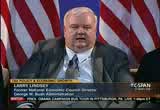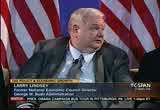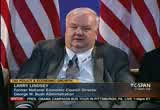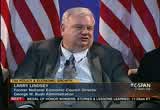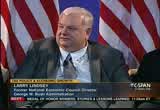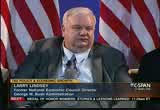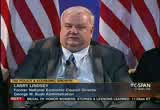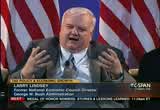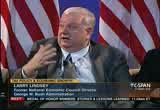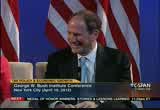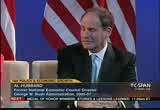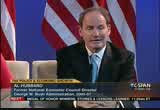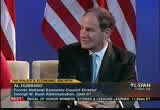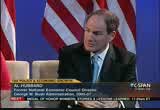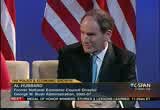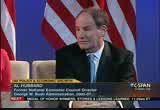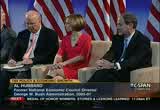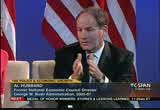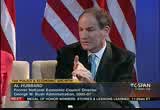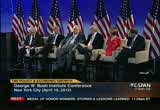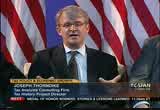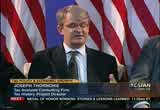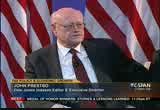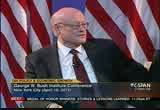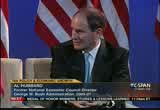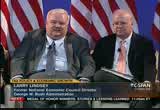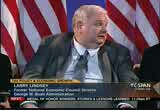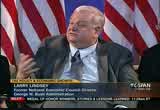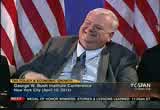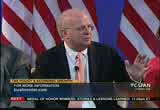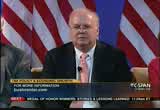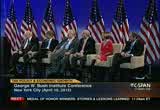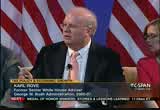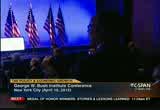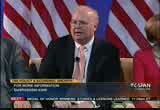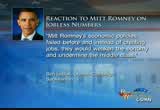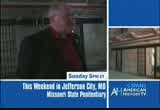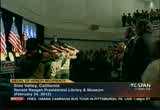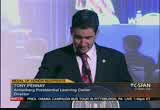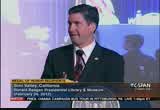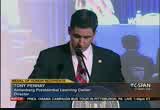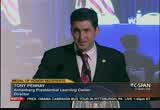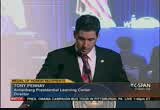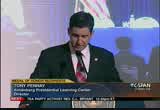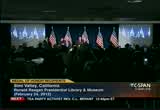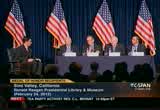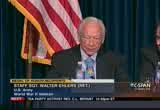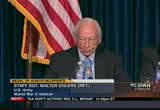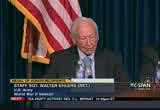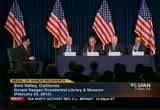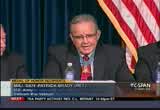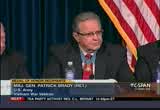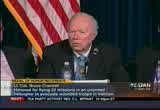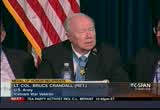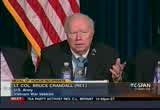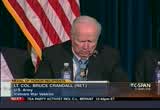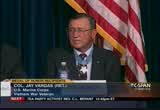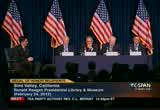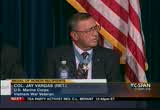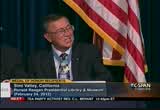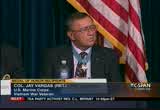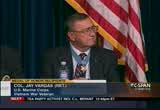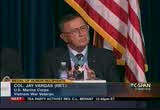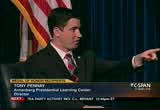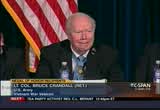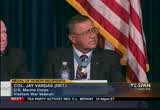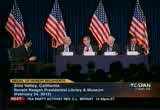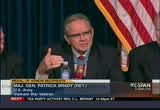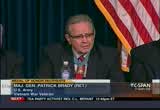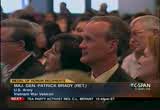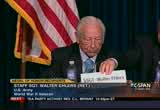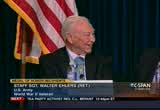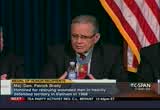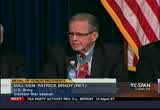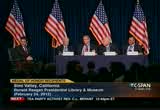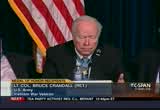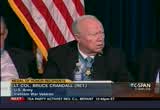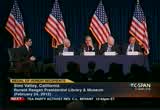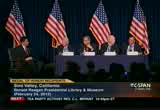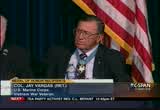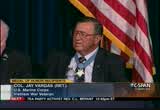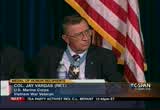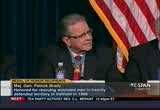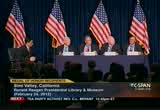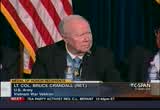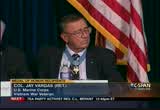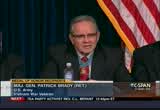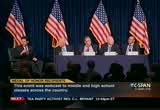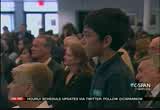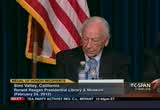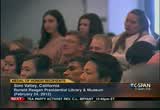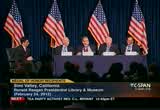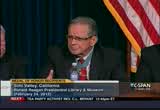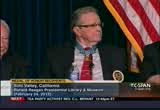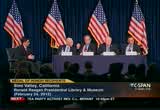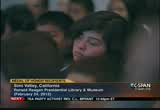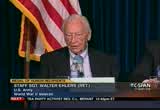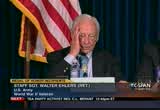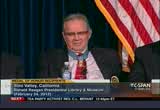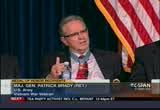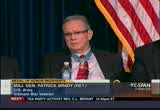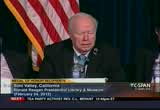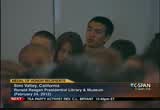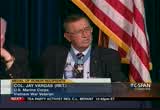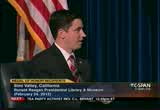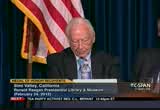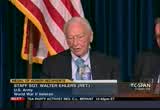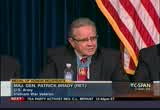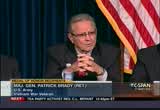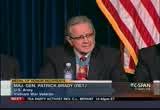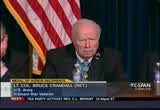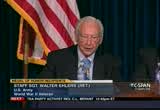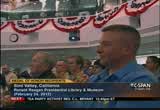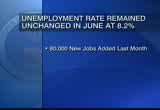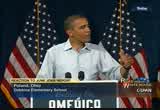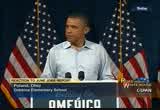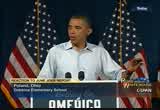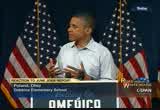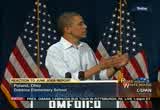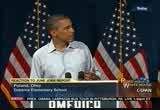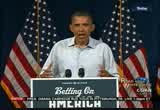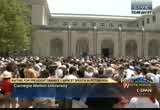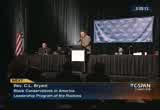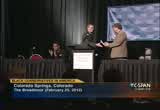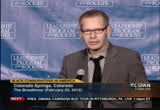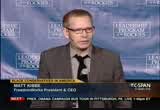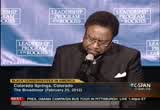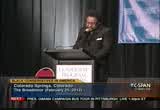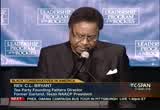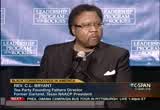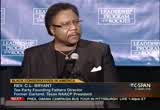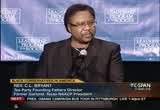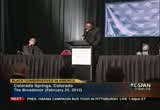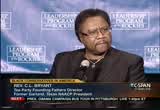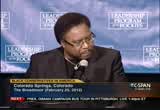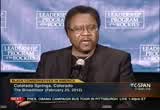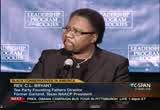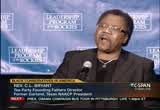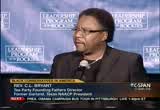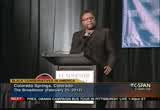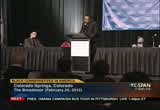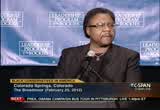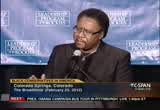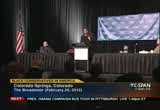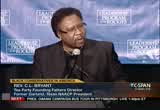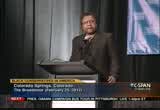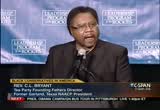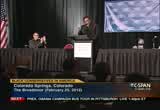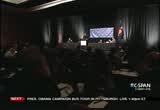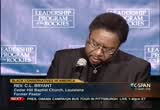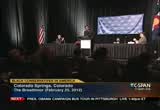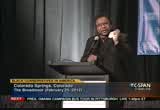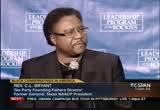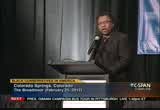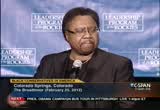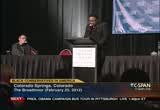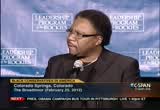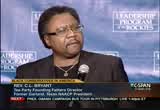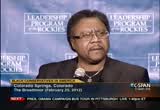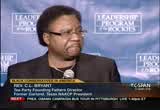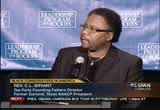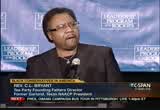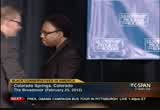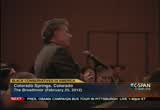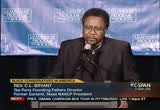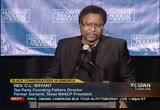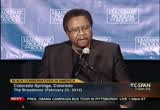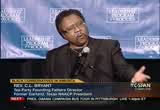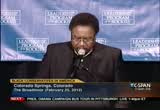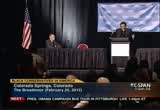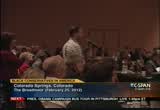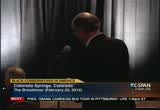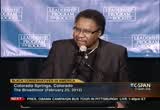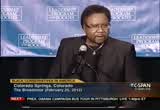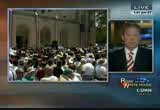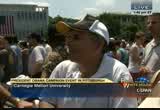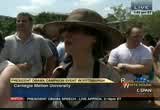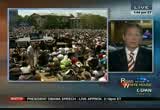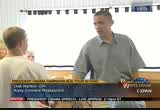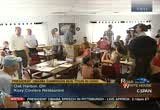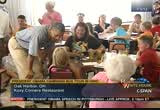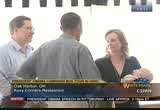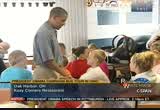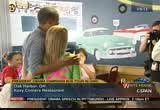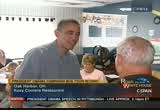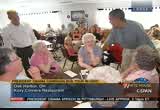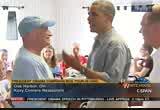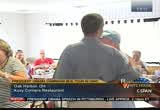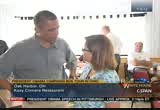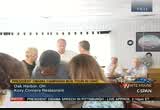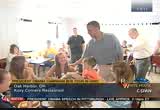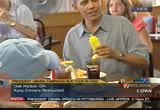tv U.S. House of Representatives CSPAN July 6, 2012 10:00am-2:00pm EDT
10:00 am
get the stories people are interested in and bring them to them around the world. host: how much are you interested in pop culture? guest: we tried to reflect every bit there are dangers in traditional news organizations trying to be pop for the sake of being pop. there are huge trends. anyone in america cancer at the moment what technology is doing, how it is liberating you and how they can express themselves in new ways. that is something we have to capture. -- anyone in america can see. at see. host -- anyone in america can see at the moment.
10:01 am
caller: we are not getting bbc anymore in our town. host: what everyone should do is call their cable provider to try to get bbc world news. it is available in many cities now in america. there was a deal recently with comcast to put it into some big cities where we had not been before. bbc world news is our 24 hour news channel and world news america is our flagship show every day. we want those to get to as many americans as possible. call your cable provider and asked them to give it to you. host: are you streaming online? do you have concerns about it taking away from televised audiences? guest: on big story is we will stream. you don't want to confuse people and offered things in
10:02 am
too many places. the online offering is primarily our website with a lot of video and audio. for the big stories, we often go to a live stream of bbc world news or the news channel, our sister station in the u.k. host: republican caller in indianapolis, lincoln. caller: just a heads up, my phone is almost dead. host: we will have to cut your calls short because we have to go to an event right now where mitt romney is speaking. i am very sorry. simon wilson, we appreciate your being with us today. guest: thank you. host: that's all for washington journal. calle[captions copyright nationl cable satellite corp. 2012] >> american families are struggling. these numbers understate what
10:03 am
people are feeling and the amount of pain occurring in middle-class america. not only is the 8.2% no. unacceptable and one that has been in place now over 41 months, in addition if you look at the broader analysis of people who are out of work or dropped out of the work force or that are underemployed in part- time jobs, leading full-time work, it's almost 15% of the american public. if a number of those that are working in jobs well beneath their skill level, working in multiple part-time jobs, kids that are coming out of college not being able to find work, veterans coming home not being able to do anything but stand in the unemployment line. if these are very difficult times for the american people. there are other troubling numbers. the manufacturing reports of the last several weeks indicate manufacturing is not growing either domestically or in exports as we would have expected at this stage. that is a long-term trend that
10:04 am
is very disturbing and troubling. the president's policies have clearly not been successful in reigniting this economy, in putting people back to work, in opening up manufacturing plants across the country. the heartland industries where manufacturing occurs are struggling by virtue of policies on the part of the president. the highest corporate tax rate in the world do not create jobs. the highest regulatory burdens in our nation's history, those do not create jobs. trade policies that are not opening new markets for american goods, particularly in latin america, if those don't create new jobs. failing to effectively crackdown on china for cheating and stealing american jobs has not helped. the president's policies have not gotten america working again. the president is going to have to stand up and take responsibility. i know that he has been planning on going across the country and
10:05 am
celebrating when he calls "forward." it does not look forward to millions of families struggling today in this great country. it does not have to be this way. the president does not have a plan. he has not proposed any new ideas to get the economy going, just thece a -- same ideas of the past that have failed. my plan is to get america working again and create good jobs near term and long term. if it includes finally taking advantage of energy resources, building the keystone pipeline, making sure we create energy jobs and that we convince manufacturers if that energy will be available and at a low cost. it means opening up new markets for american trade, particularly in latin america. it means cracking down on china when they cheat, making sure they don't steal our jobs unfairly. it means bringing our tax rates down. are marginal tax rates down, and cutting out exemptions and
10:06 am
deductions and loopholes that are not fair in many cases. in other cases we will limit those deductions and exemptions so we maintain our revenue through growth and through limiting special deals but bring the tax rates down so they are competitive and attractive for jobs to come back to america. it means having a government that sees its role as encouraging enterprise rather than crushing it with the burden of unnecessary regulation and h outdated regulations. it means having a health care plan that focuses on bringing down the cost of health care for american families, not just adding new expenses and new taxes to the american people. this is a time for america to choose whether they want more the same, whether unemployment above 8% a month after month is satisfactory or not. it does not have to be this way. america can do better. this kick in the gut has got to
10:07 am
end. i'm happy to take a couple questions. >> [inaudible] >> i don't say much to critics. i put up 59 steps for how to get the economy going. i have not seen any from the president that show what is planning on doing. you should take a look at my 59 steps. you'll find them very specific. taking advantage of energy resources. opening up federal lands for drilling. doubling the number of permits and licenses to take advantage of oil, natural gas, coal. stopping restrictions. opening up new markets in latin america. no new trade agreements in three years under the president. and cracking down on china,
10:08 am
finally going after them aggressively and saying you cannot continue to steal our jobs. how do you not talk about being serious about creating jobs through manufacturing policy is to make america more attractive for investment and growth? tax policies, want to bring down the corporate tax rate to 25 and the individual marginal tax rates, 20% across the board. you don't see those specifics coming from the president. >> president obama said that you are abandoning the individual mandate because of criticism from right. >> i have spoken about oak terrace since the day we passed it in massachusetts. people said is this something you apply a federal level and i said no. i want states to be able to
10:09 am
create their own plans. -- i have spoken about health care since the day we passed it in massachusetts. three-quarters of small businesses say they are less likely to hire people because of obamacare. job one for the president has to be creating good jobs for middle-income americans. that is what i am going to do. >> will there be deep spending cuts if you are elected? [inaudible] >> what i described in my plan is a series of changes to programs and elimination of programs which would save more and more money over time so we are able to get a balanced budget i eight years to 10 years. -- in 8 years to 10 years.
10:10 am
the growth of the economy would pick up at 4% or better. if america would be at a 6% unemployment rate within four years and then getting better and better after that. >> you have criticized president obama for taking vacations. [inaudible] >> i am delighted to take a vacation with my family. i think all americans appreciate the memories they have with their children and grandchildren. i hope more americans are able to take vacations. if i'm president, i will work very hard to make sure we have good jobs for all americans who want good jobs. as part of a good job, the capacity to take a vacation now and then with their loved ones. >> you said that there were a
10:11 am
number of factors outside your control in massachusetts. [inaudible] >> any jobs figures, there will be factors that come and go that you cannot control. of the things you can control, you want to get right. if in the case of president obama, this is not a monthly statistic or even at half yearly statistic. we have looked at almost a full your years of policies that have not got to america working again -- almost 4 years. we have seen obamacare is made it less likely for small businesses to hire. we have seen his financial regulatory burden make it less likely for small banks to make loans to businesses that need small bank loans to get started and to grow. his policies have not worked. that is not a short time. that's over four years almost. the american people have not had a chance to see whether his policies will help america and help them and tell people looking for jobs or whether
10:12 am
those policies are counterproductive when it comes to jobs. i think the evidence is in. remember, the president at the beginning of his term predicted that if he was able to put in place this stimulus and his other policies, but they would be able to keep unemployment below 8%. 41 months of 8% pretty much defines a lack of success. it has been a failed series of policies. their prediction was unemployment would be a 5.6% now. instead it's a point to%. millions and millions of families are struggling and suffering. -- instead, it is 8.2%. i want to encourage job growth in this country. that is a very simple strategy. keep the burden down from
10:13 am
10:14 am
others, calling today's job figures another "kicked in the gut to middle-class families." employers added 80,000 jobs in june. the economy has added only 75,000 jobs a month. the unemployment rate was unchanged at 8.2%. expect to hear more reaction from president obama? as he continues on is "betting on america" bus tour that began yesterday in ohio. two scheduled stops today. one this morning at 10:45 near youngstown at an al elementary school. at 1:50 eastern he will speak at carnegie-mellon university in pittsburgh, the last stop on his door. we are there now live. if this is the college of fine arts lawn outside carnegie- mellon university. our producers indicate the first person to or live was around 5:00 this morning and already
10:15 am
10:18 am
>> people waiting to get inside to hear president obama later this afternoon. doors will open in about two hours, the president speaking later this afternoon. just ahead of that, at 10:45 he is speaking at an elementary school in ohio. you can follow that live at c- span.org. we will have the president goes the comments like this afternoon at 1:00 in the eastern at carnegie mellon university. that's right here on c-span. >> we had pulled in around 9:30 that morning and -- >> the former commanding
10:19 am
officer of the uss cole on the events surrounding al qaeda's october 2000 attack that left 17 dead. >> i was doing routine paperwork when there was a thunderous explosion at 11:18 in the morning. if you could feel the destroyer quickly thrusting up to the right, violently. the ship was doing a three- dimensional twisting and thrusting. we came back down in the water, the lights went out, the ceiling tiles popped out, everything on my desk lifted up a foot and slammed back down. i braced and grabbed my desk until i could stand up again. >> , ma on sunday at 8:00 on c- span -- more on sunday. >> the life of a sailor includes scrubbing the deck, working on the sales, climbing aloft, would never do the assigned, but by
10:20 am
the end of the day you are ready for rest. but you don't get a full eight hours sleep. it's a four hours on and four hours of. if >> the life of an enlisted man aboard the u.s.s. constitution during the war of 1812. >> a sailor lived in fear of the possibility of being whipped by cat of nine tails. it was always carried by a petty officer. you never wanted to see it. that's brenda frese "don't let the cat out of the bag" comes from. >> that is sunday and 7:00 p.m. eastern and pacific. and our series on the key political figures who ran for president but lost. , on candidate alice smith sunday.
10:21 am
>> george w. bush celebrating his birthday. any move to raise taxes, he said, would discourage economic growth. that echoes the words of other republican leaders. he said that increasing taxes on high-income earners were hurt job growth. he spoke at an event hosted by the george w. bush institute. he's filed by new jersey republican governor chris christie, who talks about efforts to balance the budget and cut taxes in his state. >> your attention, please. governor, you are out of order. secretary evans, you can open the cabinet meeting with a prayer. [laughter] we have been given the impossible task. we have to cover 92 years of federal tax policy in less than 60 minutes. we are going to do it by decade. we will have 12 different presentations on those nine decades. i will leave the extensive biographies to be found in your notebook to suffice for most of
10:22 am
these people. you know them. i will give. a brief give they have each been asked to describe their decade or decades in a word or phrase. why not launch into it? we hope to have enough time for each of them to go at each other in mortal academic economical contact. there will be blood on the floor. with thert with 1920's director of the 4% growth project. she has also worked on a terrific biography of calvin coolidge that will be coming out. "silent cal." she will talk about the 1920's. the roaring '20s. >> thanks for coming. they did not start with a roar. we always look for comparisons
10:23 am
in history. i'm looking at it for the point of college. when he was coming to washington. -- calvin coolidge. the federal debt went up from $1 billion to $26 billion. it was out of control. taxes were in the '70s. they had nationalized the railroad, killed it, and then denationalized. there was no area into which the government would not go. they had inflation that they refused to call inflation, because it was embarrassing. if workers were underpaid and were going on strike like in russia, which had just had a revolution. we think we have hard times, there was greater uncertainty then. you look at that recession. what was the policy response to
10:24 am
the aftermath of world war rooad -- world war i. there was even a bombing of wall street after world war i. so they raised the interest rates 300 basis points and cut the budget in half. if that was the policy response of the administration. unemployment and inflation and general upheaval and mystery. so they cut the government in half partly because of the war. many angry disabled veterans. they raised interest rates like crazy to prove to the world you are serious about inflation. what was good about what they did is they set the direction of taxes down.
10:25 am
so there was less uncertainty about taxes. this is just are down payment in terms of tax cuts. we will go all the way. as certainty build that the government certainty firstmeante economy began to come back. so the decade was a roar where you had a serious productivity gains, great happiness among the population, general bounty. you found that lower earners paid less taxes as the rates come down. their top rate that they got to was 25%. that remains the gold standard tax rate for us now.
10:26 am
top rate of 25%. shall i stop there? >> one minor historical note, the first director of the bureau of the budget was charles dawes under the harding era. he became vice- president under calvin coolidge. >> there was a terrific law that we repealed in the 1970's and they did it by calling them into a room just like this, the department heads, and yelling at them. you must cut your budget by 1%! the departments behaved and did what the president said. >> for slightly different view of the twenties is the executive director and editor of the dow jones indexes whose view
10:27 am
is slightly longer and a little more downbeat at the end. from bust to boom and back again. >> it was a time of big change. the capital gains tax rate was in the '70s in world war i, as high as 8%. it was cut down to 12.5% in the early 1920's. that helped the big stock market rally that happened in the latter part of that decade when the shoeshine boys and the taxi drivers were buying stocks on margin, barring as much as 95% to put into the stock markets that would never go down except that it did in 1929.
10:28 am
over two or three days it lost over 20% and continued down into the depression. the interesting thing about the dow jones industrial average from 1922 when the capital gains rate was 12.5% through 1933, which some people think is the depth of the great depression, the dow jones gained 1.75% over that time. that's because it was starting out pretty low after the war. the crash wiped out a lot of that, but there was some bounces in the early '30's, so it was a perioed of great
10:29 am
exuberance, great intention. -- period. my favorite was the a new invention of the automatic bread slicer that happens in that decade. and the first talking pictures, the first movies in color. all of that was a great innovative time in american history. of course the depression was a downer for everybody. >> john, thank you. you left out of the one innovation of the 1920's which has doomed western civilization. that is the discovery of the television set by farnsworth. , but we havewhy slightly different views on the 1930's. view of thet her 1930's, entitled "wrong direction." and then joseph thorndike with his view of the 30's, which is
10:30 am
an title "fair share." >> there was less concerned for growth in terms of companies and less interest in the private sector. you see the tax rate go up under herbert hoover. that was a great sorrow of the republicans, that they betray themselves by raising taxes at the very end, going from 25 into to the '60s where there were a lot of ugly taxes including a tax on checks at a time when you want people to transact. they were trying to raise money because they were short, because the depression had started. then you go into the 30's and you see the government's scrambling for revenue, raising rates. what happens? the revenues were disappointing. the economy -- we are looking at
10:31 am
the tax factor today. after the monetary and credit events and all the trouble, there was not enough money to go-around. the government was scrambling with taxes. they often found they did not have enough money. then the government grew a little angry with the economy, because it was not yielding its bounty. later you see some weird and vindictive taxes which are hard to explain, such as the undistributed profits tax. the businesses are not spending what they could be paid on wages. they are hawking their money. so the government is cross with the economy, a bazaar dynamic we have seen repeated self more
10:32 am
recently. towards the end, you see the government get together with businesses again because of the war. the person we were prosecuting is now our partner in washington and we are meeting together and spending for the war. that's one component at the end of the depression that we tend to neglect. there was also the relief of the companies that there were no longer targets and were instead partners. >> joe is going to do three decades starting with the 1930's, which is "fair share." he will do the 1940's. and the 1950's. you have about 10 minutes to do 30 years, joe. >> i don't know that she and i disagree on much about the 1930's. one of the unsung stories -- the notion of fair share is a phrase
10:33 am
that gets confused all the time in the 30's, -- gets used mostly by democrats and people in the roosevelt administration. the government in the 1930's was still raising a vast chunk of revenue with a very regressive taxes, raising it with excise taxes on alcohol and tobacco. these are providing a very large chunk of federal revenue a long time, more than the income tax. the roosevelt administration does nothing to get rid of the excise taxes, because there was a genuine strain of fiscal conservatism? in the roosevelt administration. some people might challenge that, but it was true. they were not willing to give up the money from these very productive old taxes. what they would try to do is balance the regressive taxes by ratcheting up the rates on a variety of other more progressive taxes, particularly the income tax, corporate and individual, and the estate tax.
10:34 am
this is the heir of the wealth tax act of 1935, which dramatically raises rates on the states and in comes -- on the estates and incomes. it raises a lot of money on the richest americans. a bunch of economists especially in the treasury department by the late 1930's and particular said that we are all in favor of progressive tax reform, but we might consider lowering the rates on the richest americans and reducing or eliminating some of the more burdensome business taxes, because they were worried that roosevelt's tax policy was inhibiting recovery to some degree. the new deal people had a response to that. it was essentially that by -- sort of elements of keynesian
10:35 am
theory, developed by taking money away from rich people and corporations, you would get all this accumulation of capital from the rich people and giving to the poor and they would spend them and that would encourage the economy to recover. that argument is not driving tax policy in the 1930's, but it's an important part. by the end of the 1930's, you see them reconsidering all this, partly because roosevelt's administration was losing a lot of political battles. some of their marquee progressive tax reforms get gutted almost immediately by congress within a couple years. it's gone off the books essentially. then the war. the war dustings the discussion entirely. the federal government is faced with much larger revenue needs. their first response is one of the treasury department had
10:36 am
suggested for some time, which is we will have to tax the middle class with an income tax. until then, only rich people pay the income tax. they said this is our most efficient tax, the most fair tax, a point to raise the most money. so they did that over the course of about five years or six years. a number of income -- the number of income tax payers goes up by seven times or eight times. it does become a middle class reality in the way federal taxes never had been before, with the exception of social security tax in the mid 30's. the driving force behind all this is a resurgent fears of inflation. they are extremely worried about runaway inflation during the war. they tried to deal with that with price controls but they also use progressive taxes, extremely heavy taxes to try to drain producing power out of the economy. by most accounts, it does a fairly good job. the economy recovers from depression very effectively.
10:37 am
world war ii is called a gdp united statespwon o won on its capacity to produce. excess profits tax is taking almost all taxes away. they're very concerned that people are afraid to invest. at the end of the war, use in natural sort of pullback in taxes. there's a moment when tax rates come down and tax burden comes down here that happens a little bit in the 40's of especially because the republicans won an election. truman pushes back against that effectively. he embraced new deal definitions of what constitutes fairness in taxation. he's not excited about cutting rates.
10:38 am
the rhetoric has not changed at all over. the over but truman is able to push back against it. then there's the war in korea. that pushes the rates back up. the real question comes as what happens in the '50s after 1952 when you have a? republican a the paradox is you have a republican president, you have a peacetime economy after the end of the korean war and yet the tax rates stay extraordinarily high. over 90% during world war ii and dropped down for a minute and they stay over 90% throughout the 1950's. the eisenhower administration does nothing to challenge that. that is perplexing. you see this a lot in contemporary debate about tax policy. holding the correlation of you find under high tax rates we
10:39 am
have had high growth. so the implication being high taxes must be good for growth. the reality is the 1950's are anomalous. historians tell you that you should not go fishing around for policy lessons in history because there's no good point of comparison. but the 50's are particularly bad point of comparison because it is a unique time in u.s. history. we are economically dominant on the global stage of like we never had been and never would be again. those high rates could be maintained with a relatively minimal economic damage for a while. what is driving the eisenhower administration to keep these rates is a deep and abiding fear of inflation. eisenhower is extremely worried that the economy is going to overheat. extremely worried about deficits. he is all about fiscal responsibility. he makes a deal with democrats to protect rates as they existed during the war in exchange for
10:40 am
some restraint on spending, to try to get back to a. balanced that is the only factor that really matters in 1950's tax policy is his commitment to not cutting taxes and trying to restrain spending. -- made a deal with democrats to protect rates as they existed during the war in exchange for some restraint on spending, to get back to a balanced budget. the effective tax rates start to decline. high margins create incentives to create loopholes. congress is very good at selling those loopholes. effective tax rates are at 60% during the war and drop down to about 40% after the war and then about 30% in the 1930's, this is the effective tax rate on the % of earners.
10:41 am
-- top percentile. that leads us into the 1960's and when we actually do see some great reductions. >> thank you. all we have another three- havehitter. the youngest federal reserve board governor in history at the time of his appointment. and my colleague in the bush and administration on the second floor as the head of the national economic council. he will cover the 1960's, 1970's, 1980's. two the decades with a bad decade in between. victory, disaster, and the pivot point, the 1940's. >> thank you, carl. the 60's are interesting because it is the time when economists that dangerous. what gave us our ability to be
10:42 am
dangerous was [unintelligible] . we began to figure out all these theories, keynesian theory, which actually calibrate. 1970's, 1980's, the economic recession beginning to experiment in ways it had never done before. looking at income tax data from 1960, the top rate was 91%. there were 8 americans who paid 91% tax rate. [laughter] >> there was a bracket in the 1930's that had one. >> there were avoidable. you have to scratch your head and worry about the gene pool that produced those eight.
10:43 am
how ere they avoidable? by doing something that was non- economic. if you could -- if your tax rate is 91% and you have an economically viable project that produces 10% returns and one that produces a two% return with a 91% tax rate, you go for the to% project. so there was a lot of that going on. the other thing that helped was we had a president who knew what it was like to be rich. that was john kennedy. kennedy was very well aware and may be learned from his dad or from himself about the effective tax rates on people oppose the decision making. a lot of his rhetoric would be thought of as supply side. he was very anxious to cut the
10:44 am
top rate tax. the problem was he had a legacy . on his left he had the new deal legacy and a lot of his own party was reluctant to cut rates. if on the right he had the eyes and our legacy of balanced budgets. republicans were really not pushing on getting tax cuts through. the president was also worried and he had keynesian legacy. we had a recession in 1958, said his economists, and a short recession in the 1960's, so he was very aggressive at pushing tax cuts for supply-side reasons and demand side reasons. he was assassinated in 1963. lyndon johnson, who was not exactly incapable of doing political calculations, decided
10:45 am
to pick up the legacy and in 1964 used kennedy's debt to pass the kennedy. tax kennedy pickup the top rate from 91 to 70. we still think of 70 as a very high rate of tax. think of what you have just done. and 91, you keep 9 cents on the dollar. at 70, you keep 30 cents on the dollar. you have now more than tripled the after-tax returns. this is a huge supply side effect. use of rapid growth in 1964, 1965, 1966. the tax cuts were among the most successful we have ever had. the income tax collections from people at the top actually rose during this period.
10:46 am
again, 70 cents, you have tripled the incentive for people to do something. this is a win-win situation. the kennedy tax cuts were the first real proof that there is a revenue maximizing rate and it is certainly below 91 pandand blows -- and below 70. that was a positive experiment. then things turned down a bit. nixon came in. we had our aversion to the eisenhower mindset. we had a 10% income-tax surcharge, which took the top rate back up to 77. in the recessions of the early 1970's we had experimentation with one-time lump-sum tax
10:47 am
credits. a child credit of $35, which was real money back then. things like that. the thought, we had a return of the 1930's thinking. that is higher rates for fairness to collect revenue. then keynesian fiscal experimentation to overcome the recessions at that time. most of you were too young to remember the 1970's, but it was not a successful experiment. it was a disaster. it was capped with a view of the carter administration, since we have inflation, you can find rhetoric from senior administration officials testifying.
10:48 am
people get pushed into higher tax brackets and then they have less money to spend. that is a way of cooling inflation. this rhetoric we have heard all along was playing out. we end of the 1980's with a 70% top tax brackets that kicked in $200,000. that was a lot of money in 1950 and was less money in 1980. ronald reagan proposed an across-the-board cut in tax rates. when legislation got through, it included a lot of other things as well, some of which were not traditional supply side. i will cut to the bottom line. you cut the rate from 70 down to 50, instead of keeping 30 cents on the dollar, you keep 50 cents on the dollar, that is a two thirds increase in what you are. able to are suddenly, people began a lot
10:49 am
more economically rational use of their money. the disincentive to work, save, and invest were dissipated. the research on the 1980's suggests that the cut in the rate from 70 down to a 50 was a net revenue gainer. however, the overall cut across the board was a small revenue loser. this is sometimes complicated in the debate. when you cut a rate from 20 down to 4, how much of the supply side effect is there -- from 20 to 80. the guy used to keep 80 cents and now he keeps 6 cents. so the reagan tax cuts, because
10:50 am
they were across the board, overall lost revenue, not necessarily a bad thing. the top rates on net were a net producer of revenue. if you look at the data, the top rate for maximizing government revenue is probably somewhere in the high 40's. here's something we all should keep in mind, who on earth would want to maximize government revenue? we thought of the high point been a great thing to shoot for. what do we say if the government is maximizing revenue? it means we are getting all the blood from a stone that we can possibly have. it is a preference function between years the government and
10:51 am
here is society. if i don't care how society does as long as the government is extracting. that is maybe a function that maybe stalin would have. what you really want to have is the rate well below the and revenue maximizing point. the government is doing great and the rest of us are not. those who believe in lower taxes need to start emphasizing that you don't want to shoot for the maximum, that the rate should be well below. when you start crossing, 40 generally, you start making the government about $1 better off and you make a private-sector about $2.25 worse off. you do have to collect revenue. so you take the profits from the private sector and give it to the government, but the economic burden of moving that dollar
10:52 am
will cost another dollar and a quarter. as you move up into the 40's, that number rises and rises. i really think that we need to stand firm, that once you cross 40, the mathematics of higher rates does not make a lot of sense. we have a decade of experimentation in the 1980's to prove that. we have experimentation in the 1960's and 1970's about what works and what does not. that's the bottom-line conclusion. >> thank you. our final presenter is ceo and president -- ceo of an historic bottom fisher. he attended harvard on the struggling scholars program, rural operappalachian youth.
10:53 am
he was director of the national economic council. 2007 he became the only member of the bush staff to be arrested on the white house campus by two uniformed division officers of the secret service. al. >> you can see how much you can trust me and trust karl rove. karl rove has stolen my car numerous times and that's what led to this. >> does thi have anything to do with tax rates? >> larry lindsey, a professor, makes economics sound fun. we all remember the 1990's. we began with the budget deal done by president bush 41 that
10:54 am
included a modest tax increase. it went from 28 to 31. something -- 31 point something. then 39.6 under president clinton. if you recall the 1990's, there was a cover-up. it is important. the media will never get it straight. the 1990's were not the great period that the clinton administration likes to remind us of. there's no question the economy boomed because of the technology boom. stocks kept going up and up and the companies had no earnings. there was a byproduct of that. it was covering up the negative
10:55 am
impact that the tax increases had had on the economy, the narrowing of the tax base at 39.6 and other high rates have had on the economy. the other thing that is extremely important to recognize is it increased dramatically the tax collection of the treasury. since world war ii taxes as a% of gdp has averaged 18.4%. in the late 1990's when we started running a surplus, which the clinton administration love to brag about, tax collection got up to about 21% of gdp, because everyone had stock options and capital gains from these inflated stock prices and then you combine that with the fact the clinton administration dramatically cut defense spending, hollowed out the defense department. you end up with a surplus.
10:56 am
it was not sustainable, obviously. it was. up. the technology will cover up fundamental problems that existed in the economy. i feel little uncomfortable as i move into the 200's to talk about what president bush, since president bush happens to be sitting right here. i'm sure he remembers much better than i. -- the 2000's. i was only on the periphery. when you were governor in 1999, president bush, you and your advisers, many of whom are sitting here today, started talking about this by this big boom going on in the economy, there was a very real chance that the next president of the united states was going to have a recession. there was also a recognition that the dramatic increase in taxes under clinton was having an adverse impact on the economy. as a result, towards the end of
10:57 am
1999, governor bush proposed a very ambitious tax-cut proposal. that was the centerpiece of his campaign. once elected, the was successful in 2001 with the assistance of a lot of these people here, and getting that passed, the majority of which he got past. to give you a sense of what happens, the top rate dropped to 35. then the 15% rate dropped to zero and then drop to for some people. in 2003 as the economy was still not as strong as it should have been, and recognizing that there were other tax burdens on the economy, president bush proposed it -- and this was very ambitious -- was the initial proposal to take dividends and capital gains to zero? there was certainly a discussion
10:58 am
of that. >> [inaudible] >> 15. >> it's nice having the resources here to answer these questions. [laughter] so they were able to get accomplished cutting the dividend's tax from 35% to 15% and capital gains from 20% to 15%. there have been a lot of studies about what the impact the dramatic tax cuts were on the economy and on tax collection. the studies on the impact on the economy have concluded that it had an impact -- enlarged the economy by 0.7% over the long run. we have a 14 trillion dollar
10:59 am
economy right now, so 0.7% is $300 per person in the u.s.. that's how much more -- how much larger this economy is as a result of the tax cuts. the other thing that happened, empirical evidence, they studied what happened to tax collection. tax collection reduction was 40% less than would have been expected under a static model, assuming there was no change in behavior. because of the lower taxes, there was a change in behavior. you had more people working and working longer hours, an entrepreneur is taking a bigger risk, people moving their investments from tax-exempt investments to taxable investment, there was less tax avoidance. so the tax base was larger. as a result, the cost of the treasury was 40% less than what
11:00 am
had been anticipated a under the static model. the dividend and capital gains on dividend and capital gains. there was additional investment. higher productivity, higher wages, and more hiring. on the entrepreneurial sector of the economy, the ones you paid their personal income taxes the way they pay business taxes, that is 80% of companies -- interestingly enough, and 55% of private companies and almost 50% of business taxes come through flow through companies. the result was the dramatic cuts under the bush administration. you had significantly more investment, higher productivity. we have incredible productivity
11:01 am
during the bush administration. therefore we have higher wages. i call this the roller-coaster decade because we had great growth beginning in 2003 through the end of 2007. the we had the collapse caused by the credit expansion finally reaching the breaking point. started after world war ii, dramatically increased during the 2000's and reached the point was not sustainable. it resulted in the great recession that we're still recovering from. we are now faced -- we are faced with a choice. we have the obama administration say the way to get the economy going is to start taxing rich people. we have studies that show -- and tax reform and cuts of the 1980's had a positive impact on economic growth, tax increases of the 1997 negative impact on growth, and the tax cuts of the
11:02 am
2000's had a positive impact on growth. >> before we jump to questions from the audience, let's go to each of the panel members and see if they have a comment on something they heard from one of their fellow panelists. i will say, it is interesting we talked about in 40 minutes 90 years of tax policy. we are talking about enormous volatility. down in the 1920's, up in the 1930's, turned into a mass tax in the 1940's, standpat in the 1950's. down in the 1960's, -- it is a wild pattern for the fundamental tax policy in the united states over a period of time. why do we not start with you, larry. any comments to add to what al said? or questions or observations. >> i think the point of
11:03 am
experimentation is a good one. i think we are going to experiment going forward. there are some basic rules so that i think the entire -- even our friends and the other side would say, you want a rate that is as low as possible and a base as broad as possible. that is all there is to it. we can negotiate whether the top rate should be 39.6% or 25%, but that is a lot narrower range then no one that i know of who is serious about the economy thinks we should ever go back to the really bad old days. >> i just want to say, why are we here? because there is a record. we just try to lay it out to you. you can add to it. you could alter it.
11:04 am
there is a tremendous record. it is wonderful to consider it. why is that important? because easily these conversations happen as if there is no record. as of the world this starting. -- is starting anew. the 20th century is crucial at this point. >> joe. >> i think this question of volatility and tax policy is important. i do think the take-home message for me from most of a century that we looked at, it is a brief traditional tax reform in the boring, expert dominated traditional tax reform. as you just said, a broader base and lower rates. almost everybody can agree that is a good combination. liberal, conservative, whenevat.
11:05 am
nobody serious once high rates just for the sake of having high rates. not to say that argument is out there. but we would all be better off with the broader base and the lower rates. if you need an example of this, it is that the extremely high rates that some on the left do look at longingly at this point, they created an enormous amount of avoidance. and some amount of evasion. some had a legal evasion as well. what it really did was corrupted the policy process around attacks. eight tax loopholes extremely voluble to taxpayers. that undermines the whole legitimacy of the tax system. i said this earlier on another panel. i think if you are a liberal and you love taxes, then you should not like the high rates. if you of the income tax, you -- if you love the income tax, you should want low rates because what high rates do is they destroy the tax themselves. the create the loopholes and the
11:06 am
avoidance, faith in the fairness of the system declines and that is when people turn around and said, i did not want to put my money into this. i did not buy this foul the proposition anymore. -- i do not buy the volume proposition anymore. for a liberal, if you like big government and lots of tax revenue, higher rates are not the answer. for your conservatives, high rates are clearly not the answer. it seems to me that there is plenty of room to come together on the sort of boring, not exactly -- a traditional 1986- style tax reform. it is impossible to pull off. it was impossible in 1986, too, but it happened. >> yeah. john. >> in my work i live mainly at the capital gains tax rates rather than -- i look mainly at the capital gains rate rather than the overall income tax rate. i think you will find something interesting here. in the 99 years through last year that we have had the 16th amendment in the fact, there -- in effecct, there were 63 years
11:07 am
in which the capital gains rate tax was 25% or less. there were 36 years in which it was over 25%. during the 63 years of the 25% or less, the dow jones industrial average had an annualized rate of return of 6.05%. in the years that the capital gains rate was above 25%, the rate of return was 3.49%. there is a dramatic difference of 256 basis points of showing that the capital gains tax rate did seem to have any effect on behavior in the stock market. i think that is an interesting point of view.
11:08 am
>> thank you, john. al? >> i would like to pose a question to professor lindsey, please. i left out of my presentation that i forgot to mention -- i would like larry to comment on this. when you analyze the bush tax cuts, the economic growth came from the cuts at the higher end. i think they say the impact they had on the highest income people -- the bush administration, not only were the tax cuts i described, we reduce the penalty for the marriage. we raise the t credit for children, etc.. studies show that those kinds of things, although certainly important for fairness, do not have a positive impact on
11:09 am
economic growth the way cuts and especially the higher rates do and especially for the highest income people. so, professor. >> can you knock this one out of the park? >> i will do my best. president obama was even more clever than you gave him credit for. what happens was we had two problems in 2001. we had a short-term recession that was made worse by 9/11. we had eight long term growth problem where we needed to improve the cash flow of the small business sector in particular, which had been badly hurt by the stock market collapse. remember, when president bush
11:10 am
came to office, the nasdaq collapse by 80%. the economy shrank in the third quarter of 2000 before he came into office. things were not going so well and 9/11 made them worse. i think the 2001, 2003 tax cuts are two sides of the barbell. as was the need to change psychology and getting the economy moving again. the doubling of the child credit, the cutting of the bottom rate from 15% to 10%. we mailed checks. they went out in august and that turned out to be vital. this economy came to a standstill.
11:11 am
if we had daily gdp for the third and fourth week in september, it would be close to zero. we did not have planes flying. the stock market was closed for five days. although production had been shut down -- auto production have been shut down. the fastest rate of inventory drawdown we have had. if people are not shopping, the goods pile up on the shelves, then the factories shut down. the fourth quarter of 2001 pulled those goods off the shelf and that money went out in people's pockets and we were able to get the economy growing again in spite of 9/11 and in spite of everything else.
11:12 am
i would call that the demand side part of the bush tax cuts. as the top rates came down, you started to see small business cash flow revived and we had rapid growth in 2003, 2004, 2005, 2006. for all the experimentation up and down, we got supply side and the demand side right and in a way that helped the economy out. one more small point, if i may. general rove -- [laughter] >> that is not far off. >> you do not know all the names we called you. >> yes i do, larry.
11:13 am
you mentioned the 6% and the 3.5%. doesn't sound like a lot. the difference between 6% and 3.5% means the stock market would be eight times higher, 16,000 instead of instea2,000. >> we have time for maybe a couple of questions. i want to apologize to al. i did not steal his car. i was repositioning his car to get it out of the sun. he retaliated by rapid my car in
11:14 am
industrial cellophane. it was in self-defense that i asked people to handcuff him and have the photographic evidence that it's a place. let's get to a couple of questions here. >> let's have a second question keyed up. you first. we can hear you. >> i'm wondering if someone would quantify all the changes in the transactions to avoid tax. [unintelligible] they're all sorts of transactions that have come and
11:15 am
gone through the years. what are the implications? >> joe? >> i'm the wrong guy. >> here is a simple way of quantifying it. we had eight people in the top bracket. last year we had roughly 400,000 taxpayers making over $1 million . people are willing to report in come and do business that results in reporting in come. i cannot think of any more dramatic explosion than that statistics. >> we apologize for putting a picture of a bearded man in your place with your biography today. >> might have been an upgrade on the photo.
11:16 am
he talked about the part of the tax strategy in 2001 and 2003. we did these parts for fairness and we did other parts for growth. growth seems to have dropped out. the growth discussion verses fairness -- is that the strategy -- how you sell growth over fairness? isn't growth the fairness of all? >> fairness in 2001 was the finest what kind of tax cuts would benefit people that would not otherwise derive a significant advantage from the other kinds of pro-growth cuts. how can we sock it to someone
11:17 am
that is not paying enough, in our view. thing sunday child tax credit did not have implications for growth but they did have implications for the ability of families with large numbers of children to get by. the feedback was not significant. it was a way to help people get by in a tougher economy. >> jobs. jobs. if unemployment is high, it is not fair. >> yes? .> i'm from chicago government spending is about 24% of gdp. is there any way that the tax code even remotely like we have seen over the past 90 years could raise 24% of gdp?
11:18 am
it has averaged 18%. is there any way the tax code on income could actually raise 24%? >> let's have a quick show of hands. >> not within shouting distance after the war. >> effective tax rates were 60% on the top 1%. >> and much higher on the middle class. >> if you believe it could raise that much of gdp, raise your hands. on an ongoing basis, generate 24% of gdp. is that fair to say?
11:19 am
yeah. how many do not think it could? with that, thank you for coming. >> the unemployment rate was unchanged between may and june, remaining at 8.2%. african-american unemployment rose nearly a point from 13.6% to 14.4%. reaction earlier from the romney campaign and a statement saying -- the president's press secretary issued a statement, as well --
11:20 am
we expect to hear more from the president this afternoon. he will be in pittsburgh and we will have that live. a look live at the audience being let in. president is speaking out in ohio at an elementary school. you can follow that live on c- span.org. we'll be live at carnegie this afternoon around 1:40 p.m.
11:21 am
11:22 am
around 5:00 a.m. this morning. we will have live coverage from carnegie this afternoon. the president will be speaking around 1:40 and that will be live on c-span. >> this weekend, head to the state capital named in honor of thomas jefferson with book tv and american history tv in jefferson city, missouri, saturday at noon eastern. literary life with book tv on c-span2. former senator of missouri first lady jean carnahan on family life inside the governor's mansion, from her book "if walls could talk." also, a butcher's bill, a business contract, a provisions list from ancient mesopotamia to the university of missouri's special collections. the stories behind eight miniature babylonian clay tablets. and sunday at 5:00 eastern, on american history tv -- >> at one time, 1967, this was called the bloodiest 47 acres in
11:23 am
america. >> a former warden takes you through the historic missouri state penitentiary. also, walk back through history in the halls of the missouri state capital and governor's mansion. once a month, c-span's local content vehicles explore the history and literary life of cities across america. this weekend, from jefferson city, saturday at noon and sunday at 5:00 eastern on c- span2 and 3. >> a panel of medal of honor winners gathered to tell their story and lessons that apply to today's youth. they spoke to an audience of high school and middle students. this event was sponsored by the annenberg presidential learning center and the congressional medal of honor congressional.
11:24 am
[applause] >> my name is tony pennay. the video you have just seen is an introduction to the amazing work being done by our partners at the congressional medal of honor congregation. you would is the power of this educational program. it is a tradition to honor our men and women in uniform by saying the pledge of allegiance. so please rise. >> i pledge allegiance to the flag of the united states of america and to the republic for
11:25 am
which it stands one nation under god indivisible with liberty and justice for all. >> thank you very much and please be seated. before i invite our special guest to the stage, i would like to point out a few of the people in the audience that are here to suggest that learning is not stop when your diploma is confirmed. we have roy, son of late medal of honor recipient. we have in the audience corporal benjamin smith and his wife, emma. australia's highest military honor. thank you for joining us all the
11:26 am
way from australia. [applause] we have a number of members of the board as well as family members and i want to recognize a few of them. bruce, sy, nick, jennifer, and all the family members of our panel members, thank you for coming today. [applause] from the office of call for state senator, ms. linda johnson. i would like to recognize all the veterans and active deuty military who have joined us today.
11:27 am
please stand. [applause] >> president ron reagan said freedom is never more than one generation away from extinction. each generation must do what is necessary to pass on to the next order will be lost for ever. i speak to our audience when say i hope you'll notice both parts about what president said about insuring freedom. to preserve freedom is not enough -- but to preserve freedom is not enough.
11:28 am
president reagan also points out the necessity of passing it from one generation to the next. the congressional medal of honor foundation has put together a remarkable curriculum, which the stories of medal of honor recipients, and explore courage, commitment, sacrifice, patriotism, integrity, and citizenship. it is one of the finest examples i have seen of how we can pass on these generations of freedom from one generation to the next. a lot of the discussion of education happens in the media, in politics, and in general results around tests. -- revolves around tests. from kindergarten onward, you have been tested continuously. some might say relentlessly. the word test, for some of you, probably causes a physical reaction that is not positive. your scores in literacy and math are used to evaluate what you have learned and how well your schools and teachers have done. you have spelling tests, math tests, science tests, physical
11:29 am
education tests. just when you think you have been tested enough, you spend a week or two filling in bubbles on the exam. i was in the classroom for 10 years. we call these high-stakes tests. i want to let you in on a little secret. the test that you take in the classroom is not the real high- stakes test. the tests you take outside of the classroom, the tests you cannot really prepare for -- those are the real tests. a real test is standing up to one of your best friends if you think that are being a bully. the real test is being honest, even if it would be more convenient to lie. the real test is when you are on patrol in the french countryside, and your platoon comes under heavy fire from german machine guns and mortars. a staff sergeant was in this scenario when he scrambled to the top of the mound of earth specifically to draw the attention of the machine guns and the mortars, so the other members of his platoon could
11:30 am
flee to safety. in a real test is when you are flying in an attack helicopter in fog and fire, trying to rescue soldiers. it january of 1968, major general brady flew through precisely these conditions. despite the 400 bulletholes found in the helicopters he flew that day, he was able to rescue more than 50 men. the real test is when an infantry commander closes a landing zone to further helicopter operations because of the intensity of enemy fire, but you know american forces are in desperate need of aid. under the circumstances, a man made 22 flights in an unarmed helicopter, delivering ammunition, and evacuating more than 70 wounded men. a real test is when despite having slept for 36 hours, you are sent down the river to join an intense battle. colonel vargas, in just this
11:31 am
situation, managed to carry fellow marines through hundreds of yards of intense enemy fire to get them to a safe evacuation site. only after three days of battle did he allow himself to be treated for shrapnel wounds. these are the tests that no amount of cramming could prepare you for these tests. lucky for us, we have role models like our panelists, who are willing to pass their lessons on to the next generation. i invite you to please join me in welcoming these men. [applause] your seat is the first. you are in this first seat. yeah.
11:32 am
>> sit down? >> yeah. [applause] so i would like to start our panel by asking you to reflect a little bit. the name of the curriculum the medal of honor foundation has developed is called "lessons of personal bravery and self sacrifice." i would like to ask you to reflect on what that means, given your experience. and then after that, we are going to turn to our student audience for questions. let us start here. then we will head to the left. staff sergeant? >> i am walter.
11:33 am
i was born and raised in the state of kansas. world war ii broke out in europe. i was going to high school. my grandfather was actually a german born in the united states, and so forth. he told us we were going to have a war with germany, or something like this. so 1941, a graduate from high school. -- i graduated from high school. my brother and i decided we wanted to join the army. he was 4 years older than i am. we went down to ford reddick, kansas. my time changed when i had to go -- my life changed when i had to go home and get my mother i's signature.
11:34 am
my dad said he would sign, but she looked me in the eye and she said, with tears in her eyes, "i will only sign if you promise to be a christian soldier." i was shocked, but i promised her that i would do my very best. i remember from that time on she made the impression on me that if i was not going to be a christian soldier, i would dishonor her. and so i took that with me through my military career. i did not do anything unusual, and i did not do anything that would dishonor her. and above all, i did not want to dishonor god. i had a terrific military career, five years in military service. i had three landings. and eight campaigns.
11:35 am
i went all the way from casablanca and french morocco, sicily, and omaha beach, in normandy. that is how i got started. my life has been changed ever since. it was the best thing that ever happened to me, when she told me that, because i can still remember it, as clear as today, those tears in her eyes. they were coming straight from the heart. and so i lived my life. the baddest thing that happened to me in military service was my brother got killed on the d- day. i remember these soldiers all these years. i have been back several y times, and it is an honor to go
11:36 am
back and to respect the lives of these people, who gave so much. i saw so many people killed on d-day. i talked to schools all the time. one little girl asked me, "how many people did you kill?" i said, "i was not trained to kill people. i was trained to kill the enemy, and they were trained to kill me. i was probably here today because i did what i had to do. i did learn a lot from my mother, and that set me straight and honest throughout military service." >> is it my turn? [applause]
11:37 am
walter got me all chocked up here. my name is patrick brady. a privilege to meet the greatest and second greatest. that is questionable. i've been a member of the medal of honor society for many years. i know i do not look that old. the greatest thing we have done in our society is the educational program that you're here to learn about. they say -- the asking got if
11:38 am
you had to do over again, would you do it differently? we cannot. we had our time in the arena. we cannot live our lives over again ourselves but we can through young people. we have been there where you have been. you have never been where we have been. one time i screwed something of bad. my boss said, "do not feel bad. nobody is a total loss." we are here as kind of a bad example. we want to steer people around the obstacles that we face. you hear that offers go out and teach people the essential elements of the game to young
11:39 am
people. our program goes out to teach sacrifice and what a true hero is the the experiences of those dal.s who where the me that is what we're dedicated to what part of life is left for us. this is a great thing that we do and we're happy to di it i'm looking forward to your questions. >> my name is bruce crandall and it is always nice to get the microphone after pat. you might think that half of the people were helicopter pilots. that is not so.
11:40 am
we had six total during the war. we had some of the heaviest losses in combat. one of the privileges i had was commanding u.s. troops in combat and one of the greatest responsibilities was commanding troops in combat. i spent five days in fort jackson going through some of the training that our troops do it in basic training and i can barely walk now. i'm not fit for basic training anymore. i was in the same situation as many of you. i did not know what i was going to do except that i was going to play baseball. instead i got drafted by the army instead of the yankees or the orioles. batting average was up three
11:41 am
times my grade point. not too bad if you're graduating still. i ended up making a career out of the army. and part of it was because i had been raised in a home that thervice's one of requirements. -- that service was one of the requirements. my father served in the navy, my uncles had served in the navy, and my mother went to work in a shipyard as a welder. a great uncle came to live with us so he could help take care of us. my grandmother lived with us. but that was the way it was. we learn by example during the war what we owe to our country and how lucky we were to be in our country. the young people of today are probably the best generation we will ever have.
11:42 am
we thought hours was and somebody, some guy wrote an article about the second world war and said they were the greatest generation. so we always have the greatest generation. we are trying to pass on a legacy to you young folks so that you understand that courage is not a battlefield example. you all will have situations where you will be required to have courage, to say no when his dog proper answer, when others -- to say no when it is a proper answer. of the angus come to stand up for what is right. you will learn teamwork and relationships in your school life and then your real life. but you won't hopefully ever have to sit on the battlefield. -- to serve on the battlefield. no one hates war more than a warrior. we as a group feel that way. the average age of this group is my age, and i don't want to
11:43 am
talk about that. [laughter] we have three young guys that came on and they dropped our average age by one year. [laughter] that did not make me feel any younger. i am real supporter of the program, and i am willing to help in any way i can to see that it gets to our young people. even in australia, i will be glad to know the teatime is ahead of time. -- the tee time. thank you very much for having me here and it is a pleasure to be in the reagan library again. [applause] >> good job. >> good morning. the first thing i will say it's to the teachers and all the
11:44 am
administrators and employees that work in the schools around our nation, especially the state of california. thank you for everything you are doing with our young generation. i have been in your shoes. i love to teach, still do, and i know the hardship she were going through in making great citizens out of these people that are here today and throughout the state of california. to ben and emma, thank you very much for being here, and the rest of the australian team, i t's always an honor to meet another warrior who has been highly decorated. it is an honor to be in your company. thank you very much. a guess i am a little different than some of the -- i am not a helicopter pilot. i was a grunt. i was in the marine corps, and a company commander. i did save about seven of my
11:45 am
marines by going back into the battle and going forward with those that were knocked down, including my battalion commander. but there is more to that story. it tied in with an golden keys that my brothers gave to me. on the that i was about to go in to the corps. -- on the eve that i was about to go into the corprs. a lot of what transpired in my particular situation is based on those keys, and i am going to share them with you. hopefully some of you can put them in your pocket and maybe use a couple of them. i parents were immigrants could my mother was from italy and my dad was from spain. two of her sons were in world war ii. one fought on iwo jima and one fought in okinawa. joseph fought in korea and i did vietnam. the case they get me as i was -- the keys that they gave me as i
11:46 am
was departing one evening from a small town in northern arizona real very useful. it all came true. my mother, for example, already had three marines, one in korea and two in world war ii. bruce and i played college ball . he went to the orioles. when i came home, i was devastated, having not been able to climb that ladder all the way up, but i had a wonderful father who taught me, just look out for you went up the ladder. it was an honor, too. then i decided i wanted to go into the officers' corps and was in the marine corps. my mother had convinced my three brothers that you get in there, you sit down with him and tell him he is going to the navy. he is not going to be a marine. [laughter] >> smart mother.
11:47 am
>> well -- [laughter] she was. that evening, she took my brother and my dad and told him to go start the car, we are going for ride. his conversation did not last very long. my brother says, we have been told by mom to convince you not to go in the marine corps like we did. my older brother said that if you don't, we are going to break your legs. [laughter] they were all highly decorated. world war ii and korea. they did not receive the highest awards, but they received quite a bit. the golden keys as they sat with that evening with me, i want to pass them on to the young people. always set a good example. set your standards high. always take care of your fellow men.
11:48 am
number two. the third one was kind of tough. whatever you do, don't ever ask a marine or anyone you are leading to do anything, in peacetime or in combat, that you would not do. how does that relate to you? if you go back to the first one, setting in your standards and examples high. at this stage in life, you should be writing down some objectives, but make them reachable objectives. be yourself. believe in yourself. believing your god, or whatever supreme being you believe in. always, always take care of each other. truly take care of each other. learn to do it now and make your friendships today, because friendship at your level right now will always be forever. like the rest of us, and still close to my high
11:49 am
school and appears that i had when i was growing up. we still communicate. take care of each other. in my time, and then there's, we did not have drugs. how did not know what those work. -- i didn't even know what the heck they were. the main thing was, you don't need it. the energy that you can create within your little hearts and your bodies and minds is within you right now. it is a god-given gift. i will conclude by simply saying that enjoy life, it is truly a one time around. right now is when you want to establish yourself into what you want to be in the future, a great citizen, a great leader, a great future teacher, and educator, whatever dimension you want to get into. what promise me that you will take some of these golden ke ys and used them.
11:50 am
i transferred them from the corps into my everyday life, and they work. they are very simple. set your example, set your standards high, take care of yourself, and never ask anybody to do something you would not do yourself. thank you. [applause] >> now we are going to get some questions from students. many of the students in the audience have been studying your stories in going through some of this curriculum and learning quite a bit about the medal of honoring what it means. -- the medal of honor and what it means. some of the traits that are described in the curriculum. just as i know, in the audience we have bill and heather who
11:51 am
both work with the medal of honor foundation. we will start over here. go ahead. >> firstly, i wanted to thank the panel as well as the collective middle of honor -- medal of honor recipients across the country for your undying service to our country. i am here zang from arcadia high school. my question was, following your respective experiences in the field, how would your reintegration back into society? >> following your military experience. >> the question was, after your experiences in battle, what was it like to come back into society? >> i would like to answer that one, because i came back to california and became a city manager in northern california, and i like combat better. [laughter] [applause]
11:52 am
i actually spent three years doing prop 13, so those of you who were alive and understand the problem. -- during prop 13. [applause] leadership in the military or outside is the same. jay covered it. never lead from the back. don't ever do things that you don't know are the right thing to do. that goes from civilian life or outside. >> like pat, i stayed in the corps for 30 years and continued on with leadership, taking care of the marines,
11:53 am
commanding different commands from a company up to an infantry regiment of 5000 marines. but nothing changed as far as my views toward society. i was very proud of what the marines did, as well as all of us that fought in vietnam. some people cry that we lost the war. i never lost the battle. i should not say i, we never lost the battle. the war was in our hands to win, but things happen with that we decided as a society, put so much pressure on the campaign. but it did not change my views as to live and the love of my country. -- as to life and love of my country.
11:54 am
i enjoyed teaching students. >> i stayed in the military after i came back, and i don't regret -- there may be a lesson in this, i don't know. i did not want to go in the military. when i came out of high school, i had an opportunity to play football at several universities, but there was this foxy young chick, and she was going to university that did not have a football team, but they did have rotc, and it was mandatory. i hated it, every day. it.every bit of t so i kind of put up with the military, and then one thing led to another and i ended up in vietnam's for a couple of years. my thing was, i was in berlin when they built a wall.
11:55 am
-- when they built the wall. i looked around at the leadership and the people i saw who were serving their country in uniform, something i did not want to do, and i was there with norman schwarzkopf. i looked at these guys, and we get off the train in berlin, germany. there's somebody there to meet us. a guy meet me, takes me to an apartment, there stood in the refrigerator and everything. -- food in the refrigerator. the commander's wife the next day comes to see my wife, who was pregnant with our third child. wow, these people or something else. then they built the wall, we went through that kind of stress, shooting their own people off the wall. the medics were picking them up. i just looked at the people around be in uniform and said there are some really wonderful leaders here. i would like to grow up and be like them.
11:56 am
so i stayed after the time in the military and learned a great many lessons as far as courage, sacrifice, what a real hero is, those things that hopefully we'll talk about later on. so did i. it reduced audit not-- so i did not stay back in society after the come back into society after the military, i stayed in. i got to serve with some of the greatest people i have ever been around anywhere. knowing what i know now, i probably would have left home when i found out my parents were civilians. [laughter] but i love to be around military people. all young people ought to take a good, hard look at it. it will change your life. you will see leadership like you'll never see anywhere else. you are all part of the greatest generation. -- walt is part of the greatest generation. just take a look at it. it is a wonderful way to spend your life, even if you are only in for a couple of years. what the heck?
11:57 am
you are still serving your country and you'll come out with great skill, discipline, and stuff like that. i did not have a problem coming back into society after combat, not one bit. >> walter? >> i've got something to say. i am the lowest rank up here. [laughter] i am not staff sgt. i was a second lieutenant when i got my medal of honor. [applause] it was a battlefield commission, and on behalf of all the battlefield commission officers, i would like to apologize because i am a second lieutenant and the lowest ranking officer of here. -- the lowest ranking officer up here. that was for leadership. our love of the staff sergeant
11:58 am
right because it was better than second lieutenant -- i loved the staff sgt rank, it really is a higher rank than what i am. -- i had to salute all of them. it is a very good thing to be a staff sergeant, so i am kind of happy about that. i want you to know that these battlefield commissions did not come easy. you had to be a terrific leader in the battlefield to get a commission in the first infantry division. i found that out for sure. on december 9, was commissioned an officer. on december 16, on the day the battle of the bulge started, i became a second lieutenant in paris, france. so i did have some leadership training. [laughter]
11:59 am
>> we are honored to be with you all. now that you have promoted yourself, you have to buy the first round of drinks tonight. [laughter] [applause] >> on the second lieutenants pay, that is going to be tough. next question over here. >> my question is, were you traumatized by all of the wounded soldiers your rescue? -- you rescued? >> i had a real problem with blood and needles, especially the needles. whenever vaccinating me, i just hated that. the first time they took blood, i fainted. so i was very apprehensive about going into a combat situation where people were in
12:00 pm
the course of the day, into tours in vietnam i picked up over 5000 people. we saw the human body in every possible, horrible configuration that it could be in. i was really worried about how i would physically react to that. even today, if i look on television at an operation or a needle, i turn it all. -- off. in combat, in the environment, it did not bother me. what bothered me is that people were hurt. that bothered me very much, but it did not physically bother me. i was so busy with what i was trying to do. there is nothing in the world greater than to save a human life. i can't think --, the physicians -- and by the way, the teachers and the coaches do this also. they save their young lives. but to find your way through a bunch of obstacles -- with me being the greatest helicopter
12:01 pm
pilot that ever lived, i could find a way in there that no one else could find. [laughter] to work your way through the obstacles to get your hands on the person who is seriously hurt and put them in the hands of the positions that can really say -- save their lives, it was a thrill beyond anything in life that i can think of. steak, lobster, sex -- can i say that? i don't care what it is. in life there is nothing in life to match saving human life. so that thrill i guess helped me overcome my incredible physical aversion to needles and blood. so i got through it just fine. [applause] >> concern crandall, who or what inspired you to join the
12:02 pm
war knowing you may or may not come back? >> who or what inspired you to join knowing you may not come back, joining the war? >> do it again, i didn't get you. >> who or what inspired you to join the military? he's an old guy. i'm helping him out. [laughter] >> knowing you may not come from vietnam. >> inspired me -- >> i got inspired by a letter that says, "greetings, you've been selected by [laughter] "by your friends and neighbors." . i didn't have that many friends. i suggest that if they ever start the draft again, they start the letters saying "greetings, you have just been shafted by uncle sam." [laughter] i wanted to serve. the draft was on and i had a choice, i could have got out of
12:03 pm
going because i was in the national guard. all i do is tell the draft board that. but i knew i had to serve sometime and i was 5'6" and weighed 143 pounds out of high school and hadn't grown. i felt a couple years in the army playing ball would be good for me and so i went in the army and accepted it. the draft is the worst thing that ever happened to the military, in my judgment. it should not ever happen again. the draft did not give us bad people. it gave us some great people. a lot of them had college educations or partial educations but what it did was gave the local judge and the sheriff the opportunity to tell our young hoods that they either go in the army or go to jail. all they did was change where they went to jail. we had the largest stock aid we ever had. today they are all volunteers
12:04 pm
and they are doing a wonderful job. we ought to keep the military strong enough to encourage people to stay in that join, and to make their families live -- families' life good enough so that they will. if i had it to do all over again, i would have done the same thing, because i found a career in the military very satisfying. i also found a career after i got out pretty satisfying, stealing businesses out of california to come to arizona. [laughter] thank you. [applause] >> i was wondering what was going through your mind when you committed your act of bravery. >> talking to jay, i think.
12:05 pm
>> my troops, my marines, their safety, and concentrating on bringing artillery, aircraft, helicopters, gunships in through the zone to annihilate the enemy. they always came first. still do. but i believe that is the way it should be. i think my brothers gave me some grood advice about not asking your marines to do anything you would not do. i ended up taking machine gun misses and setting a couple of folks when my platoon got pinned down very badly. my troops were first in my life. >> that is the way it should be. [applause] >> that's the way it should be. >> colonel vargas, i want to know how the war changed you
12:06 pm
emotionally. >> where are you? >> he's on this side. >> oh, there you are. you know, bruce always said he was 140-some pounds and tall but i was about your size when i joined the marine corps. teasing you, you know that. emotionally, i think it was the strong belief in god that really gave me the foundation to be strong and to accept life as it came, and probably the good advice my brothers gave me. they told me some ugly things before i went into combat, into the corps, i should say. it doesn't matter what we saw in vietnam. what amazes me is what the gentleman to our right, lieutenant walter ehlers. when that generation, what they
12:07 pm
went through in world war ii, it's just unbelievable. you can't describe it. yes, we did see a lot. we did fight against some good warriors against us, but it did not really bother me emotionally. there were times when i came home, i think it's true of all of us, it takes some time to wind down. today a lot of our young troops are having difficulty with ptsd. the numerous deployments they're going on is breathtaking to me. i know pat and i talked about this. but emotionally, no, i think it's because -- the other thing is like bruce and i, we did ok in baseball. he was an all-american and i was an honorable mention all-american in our day. i think playing sports and physical activity and studying
12:08 pm
and accepting failure is something that is hard to accept, but that was one of the bullets of wanted to give you. there were times when i slipped, like all of us. we made mistakes. emotionally, it didn't change my life. i wanted to get better. that is how you should be. he should be one of the best citizens of the state of california. how is that? [applause] >> hello. my name is for megan so ther. my question is for any of you gentlemen. when you were saving men, did you think of them or did you think of their families, what they would lose? >> i think i already said, i thought solely for my marines. i went back -- as an example, there was one of my marines whose arm was just blown off, sitting by a tree.
12:09 pm
and they were-count attacking, fighting us hand-to-hand but i promised i would go back and get him. how do i feel about that? i went back and found him. what made me about sammy, when i had him on my shoulder and i was running back to give him to the corpsman, he said, skipper, skipper, i want my damn arm, so i had to go back and find his arm and i did. and we put him on the chopper with that arm. that's how i see it. [applause] >> you know, i never -- i never thought about it at the time, but when we saved a soldier's life, we were also saving a husband or a son, and also the grandchildren and great-grandchildren that would come from that one soldier's life that we saved. you don't think about that at
12:10 pm
the time. you're very, very busy. but that was something i thought about later on. and it's like any kind of lifesaving, it's just a wonderful thing to be able to do. but at the time that it is going on, you are so busy that the only emotion is really focused, concentration, to try to get the guy out and get him to the hospital. later in life i reflected on the number of grad children and children and marriages and stuff like that were involved in the lives that we saved over there. so that is a gratifying thing for me. >> you bet. pat did a lot. thousandses of mission that he flew in, he picked up not just one or two wounded warriors. he would say i would say 1,000. >> one of the things that the
12:11 pm
vietnam war produced was medical evacuation from all of our cities that are remote hospitals and stuff. that is one of the really positive things that came out of that work. -- war. we saved lots of life in the civilian community afterward. when you're in -- doing the job, you don't think about it. you never get to meet the people you are carrying out and they don't get to meet you. if i could find out all the guys i'd carried out, i would charge them $5 apiece and then retire again. [laughter] you treat the guys on the ground, they were my family. and you actually develop a sense of ownership with them. you keep that for years afterwards. we will get together in another
12:12 pm
month or so, the group that was in that battle. it is great to do. we pat each other on the back and make remarks, oh, how old he looks. i don't look old. my eyesight's bad. anyhow, we developed a relationship that's important on the battlefield, but it does come back to when you get back homeand get to meet the families of the ones you rescued and realize there's that many grandchildren running around. it's a great honor. >> that is what i said earlier. now is the time to start taking care of each other. it is not that hard. i am not saying you have to love everybody completely, but what i'm saying is now is the time to establish hot that camaraderie among yourselves and your classmates. and keep it forever.
12:13 pm
you'll never lose it. >> you know, it's surprising, though, sometimes you will meet in strange places people that you actually rescued. in combat, we knew each other only by call signs. and my call sign was dustoff 55 or double nickel. one day i am doing a demonstration at a helicopter that shows the community around fort benning held that helicopters looking combat. this beautiful young thing -- thank god i didn't say that -- beautiful young lady walked up to me and says, can i hug you? i said, you can hug me all day. so she did. shortly thereafter, her husband came behind her and he was limping. and he had -- he had a big hunk taken out of his leg. anyway, to make a long story
12:14 pm
short, it turned out that i was the pilot, because they recognized my call sign, that had picked him up in vietnam when he was wounded. another time i am going to the handball courts and somebody said, were you double nickel? i said yes. he said he did me a favor one time, what do you drink? i said scotch. the next day he has a half gallon of johnnie walker black scotch. soss there are rewards and you do occasionally meet people that you have rescued in combat which is very, very rewarding. >> thank you for the question. [applause] >> sorry. we are going to take one more live question. i also wanted to mention we have an online audience who's watching us via webcast. so after this question we will take a question from our online audience. but this will go this one.
12:15 pm
>> walter ehlers, if you could go back to war, would you change anything? >> if i went back to the war, i don't have anything to worry about -- i don't have much years left, but i would be sure that all those soldiers soldiers had as much training as they could possibly get before they were put into a war. that is the most important thing. i did not get my medal of honor for being rambo or anything like that. i was only doing my job. i had two years of training in combat before ever went to war. then, i had three years in the war. when i got my medal of honor, i was only doing my job. i went out and rescued a man
12:16 pm
who had gotten wounded after we let the rest of the squad return to cover and safely back behind hedgerows there. it is something that you do naturally. you don't think about it, and i didn't know anything about getting a medal of honor until december of 1944. i got it for the ninth and 10th of june as a staff sergeant, and everybody says what were you doing, and somebody said why did you go back and said, what were you thinking? i said i was not thinking, i was just doing my job. had i been thinking, probably would not have gone back for it. things like that happen. i have to tell you that -- i am
12:17 pm
not telling you to be a christian or anything like this, but i am telling you what it does for you. for instance, i had a man and i ask him to go to church with me one morning. he said i am an atheist. i said you can be anything you want to be. so he did. he went to church. when he came out, he said i am an atheist. again, i told him, you can be anything you want to be. we were out, the first battle we got into africa, the tanks were coming down the valley and they were shelling us and they told us to dig in on the hill up there and so pete, he's out there digging in on the hill. and he said, oh, god, help me, oh, god, help me. [laughter] what happened? after it was all over, i said to pete, i said, how come you -- i said, are you still an
12:18 pm
atheist? he said yes. i said, how come you are asking god to help you up there? he said, there wasn't anybody else to ask to help me. so that's -- you know, you hear these things, and i actually see them happen in combat. people really talking to their faith in god automatically because they thought they had given it up. it is a hard thing to give up. and actually, what are we fighting for? we are fighting for our freedom. and freedom is your religion. anybody's religion. if they want to be free they got to believe. that's the thing. [applause] >> i would like to make one comment to him. never make decisions you think
12:19 pm
you can change tomorrow. once you make one, realize that's for life. are and go on from that. you can't change your decisions next week or the week after. >> i would just add a little vignette, what walter is talking about would you do it over again. there is another medal of honor recipient named webster anderson, a great powerful soldier. he was on a hilltop in vietnam one night and the were overrun by the communist. the first wave took off both of his legs. he still fought on. the next attack, they threw a hand grenade into his position. webster caught the hand grenade and when he was throwing it away it took off his arm. they were in the middle of a tropical storm, and i managed to get in and get webster and his wounded guys and get them
12:20 pm
to the hospital where they saved his life but he lost both legs and he lost an arm and webster and i became very close. he thought i had saved his life. we would go and talk to students like this around the country. he wouldn't sit. we had to prop him up. he had two fake legs and a fake arm that he had a cane on and so we propped him up there and kids would ask questions. one kid said the same thing that we just heard. they called him mr. sergeant webster anderson. if you had to do over again, knowing what you know now, two legs and one arm, would you do it again? webster looked at him and said, kid, i only got one arm left, but my country can have it any time they want. to me, that was the definition of a true patriot. webster anderson, a great black soldier. [applause]
12:21 pm
>> one of our recipients on the war on terror is leroy petri who is in fort washington right now. ask him that question. ask him if he would do it again, and he said i would do left-handed next time. good attitude. >> the question that comes from online. can we bring it up on the screen? students have been submitting this over the last couple of weeks. this one, what helped you to be strong, think clearly and not to give up? so in the situations you were in in battle, is there anything in your past or your training -- what was it that really helps you in that moment of intensity and danger that really helps -- helped you to rise to the occasion? >> did you hear the question? >> i think it was training.
12:22 pm
in my case, i could never go home and embarrass my brothers. that was the big thing. they had already proven themselves. i want to go back to the love of troops. i really do. when you lead them into combat, and pat covered this, you better know what the hell you are doing. you better be carrying and you better be smart and the art of anticipation is a lost art among american society today. so to you, learn how to anticipate. that was another key my brother gave. >> what inspired me to do what i did is that i had a lot of training in the military service. i was a leader of a squad that hadn't had any combat training before we went into normandy and when we got into this situation
12:23 pm
in the hedgerows, we knocked out three machine-gun nests and then we knocked out a mortar position. the next day i was inspired to do because i was the leader of my squad, and i knew it -- the number one thing i could smell the germans so i led my squad. i had a company commander -- not a company commander but a platoon leader who had just came over from fort bening, georgia. he had 39 -- 90-day wander and he was a lieutenant and he told me to go out -- the company commander wanted us to send out a squad and go into this town. my platoon leader told me to take the squad out and i started to lead the squad and
12:24 pm
he said, sergeant, we don't do it that way. i said, oh. and he says, i am -- send out two of your scouts and he says, i'm going to follow them, and then you bring up the squad behind them. i said, that is not the right way to do it. my squad was not that well trained. i said well, that is why i do it. he said, this is a direct order. so he says, you bring up the squad after we go out. so they go out. this is in germany. and they got into a shell hole in the siegfried line there. they had a lot of bomb holes in that particular area. and they got pinned down in there by a tank sitting in a little old town out there and across an alley and they saw these guys coming across the field. so they started firing on them. they got into the hole and they couldn't get out. so i brought my squad around and i got a bazooka and we
12:25 pm
aimed at the tank. hit the tank in some soft spot. we didn't know. i knew where to shoot at and that's what -- where i had him to shoot. he never shot the bazooka before. so that was his first shot and it hit the soft spot and these germans came out of that tank like flies and first thing we went over and we captured -- we went out there and we captured the tank and i went back and i said, lieutenant, it's ok to come out now. [laughter] and he did and then he apologized to me. he said, i'll never tell you how to run your squad again. [applause] >> i would -- you know, the one thing that you learn that i
12:26 pm
learned in the military and you learn this in life, too, that we're not all born equal. just not. you look around you and you see people bigger, faster, smarter, stronger, god forbid have better hair than you have, and so we are not in terms of ability and terms of opportunity, we're simply not all born equal. but there is one way and only one way and i think this is the key to success in life and what we try to teach in our program, that we are all born equal. that is in terms of courage. each of us can have all the courage we want. you can't use it up. and it's the secret to success in life that produces great people from those among us who were not given great ability and who did not have great opportunities in their life. so courage to me was a very important thing. where does it come from? it's the key to success in life
12:27 pm
but where does it come from and what allows you to use courage on the battlefield or anywhere else? and the answer is simply faith. i have never seen anything else to explain what people do in combat or in the classroom or anywhere else. faith. i believe there is something to work dying for, something worth somewhere above and beyond the person that you are that is more important than that particular moment. i can explain my faith. i would not do it for anyone else, but fate is the foundation of courage. courage is the key to success in life. i have said this before and people said, i have been almost dead a bunch of times but i have never been afraid. faith was a substitute for fear. it allowed me to do things that otherwise would not have been
12:28 pm
possible. faith is the source of everything and anything that i ever did in combat. faith was the source of anything and everything i ever did in combat. [applause] >> you know, pat is right. as i said earlier, believe in your god or your supreme being or the great spirit or whoever you believe in. he is right. i don't think a day goes by without communicating with the big guy to watch over me. i even asked him to help me on the golf course, but he has been letting me down. [applause] >> no strokes for you. >> jay had his family that he was afraid of. the marines in his family gave that courage to him. one of the things that i got asked the most when i came home was, didn't you have fear? and i did have fear, but it was
12:29 pm
fear of making a bad decision that caused one of my men to die or some of the men i was supporting. so fear of -- fear for your own life was not in my category. i was more afraid of making a bad decision. that is more important when you are doing those things, in my judgment. the lack of -- you should have fear you are going to cause a problem for your troops. but not fear for your own self. >> that is well put. i have two bullets that i failed to pass on to you. don't ever -- if you fall or you fail, it's not the end of the world. i was just over in new mexico talking to some of the students and some of them were -- had blown an algebra class. there was no way he could get through it. two of them.
12:30 pm
and they were ready to quit school. don't ever quit. get into some other general math or something. we are not all scientists. and i wasn't worth a darn in math. yeah, i took algebra. when i started taking calculus and gentlemen om tree i said, that's it -- geomatry. i said, that's it. i had to go into problem solving. get back up. and don't be afraid to -- as pat put it very well, you know, lean on your faith, get back on your feet and keep going forward. what bruce hit upon in a way, if you make a mistake, admit it. if you truly know that you made a mistake, don't ever hesitate to say, i made a mistake. because a lie just gets you deeper into, you know, your
12:31 pm
inner soul. so -- [applause] >> it pains me to do this, because i think that given the opportunity, we could sit here for hours upon hours. just the sea of questions and all the students who lined up. but we are out of time. so here is what we are going to do. i am going to ask for one thing. i know that part of the program, the medal of honor, and the learning program, is bringing medal of honor recipients into classrooms via skype, maybe asking questions. those of you still have questions, have your teachers get in contact with me. we will put them in touch and we will get those questions answered. i don't want you to leave here feeling we have had a question has been unanswered. i apologize tremendously. i would also like to ask, at the beginning of the talk
12:32 pm
today, colonel vargas mentioned keys he was given. in closing, i would ask that each of our panelists give us one key. i know students were asking about advice and given your heroism and courage, if you had just one key to pass on to our audience today, as a final word what would that be? >> you heard me say earlier, believe in yourself and be yourself. it is very important to be yourself. i have seen too many great students dress like those guys, the pants are damn near falling off. so i say, be yourself and believe in yourself. always believe in yourself. that is my advice. >> one thing, if i didn't have faith i wouldn't have been able to do what i did.
12:33 pm
i left it in god's hands. i figured that i had to do this because it had to be done. it wasn't -- i had no control over when i was going to die or anything like this. i was fighting to live. so i never worried about dying, but i was really scared all the time. i was fighting to live. i was not fighting to die. and i put my faith in god, and somehow it worked, and i am still here today. and i still have my faith in god and in my children and in my grandchildren. i instill faith in them too because i think they should know it. the best thing you can do in your lifetime is to have faith and not to be the -- not to be a hero. i would -- i didn't go out to be a hero or anything. i had no idea i was ever going to get a medal of honor.
12:34 pm
i read about in the stars and stripes. that is how i found out i was getting a medal of honor. when i got back to my outfit my colonel said, sergeant ehlers, what are you doing here? you are supposed to be back in the states getting the metal of honor from the president. i said yes, i read about it in the stars and stripes. i got it from john c.h. lee in paris, france. it's a great thing to have faith. >> my friend here, it takes him a while to get his thoughts together, so i'll go before him. the thing i would leave with all of you, and i want you to go to the program. we teach you there the keys to success, source of courage is faith, sacrifice, love in action. the source of the key to
12:35 pm
happiness in life and a hero can't separate goodness from a hero, celebrities are not heroes. so you go through the program and learn those things. but the one thing i would leave you with is to look around you and realize how blessed you are to be an american, how extraordinary it is. [applause] the other thing i would ask you to do, and we are all part of this. america has no kings, no queens, no dukes and duchesses and all that stuff. but we do have a nobility in america. and america's nobility is called veterans. and so that's what we -- those of us who are part of america's nobility do is try to pass on to the younger people in terms of being a bad example, as i said, a way around our -- the
12:36 pm
obstacles that we met in life. you know, i was on the golf course with my friend the other day laying out the tape measure that measures how close you are to the pin and he said, here's your life span, brady, and here's where you are. and here's your life span and you guys are right here. and so you might as well be further ahead when you get to where i am than where you are today. every day as it begins, that's it. be further ahead when you get here than you were when you were right here. and that's the thing we try to do through this program that we have. and we're living our lives over again through you and try to keep you from making thesame stupid mistakes that we made as we struggled through our lives. you are so blessed to be an american, and that is very
12:37 pm
important. [applause] >> i got the mic last after pat. he referred to me as his son. usual he says illegitimate son. the one thing i would tell each of you, if i was to only give you one thing, is to have self-respect. respect yourself, and you will respect others. when you look in the mirror in the morning, be happy with what you see. you can't change it much, but in our country we lost a lot of civility and i would like to see that come back. and self-respect is the key to that i think. those of you that are in school now, i would encourage all of you to go out and get your
12:38 pm
education no matter how long it takes, keep going to school, keep learning. [applause] >> i have one last thing to say to you. you all live in the greatest country ever. this country has freed more people since world war ii than any of all the other nations combined. this is an actual fact. you can look it up in the history books and you can find out that countries that we fought against or liberated became democracies. germany is a democracy. france is a democracy. freedom from the nazis. italy is a democracy, freedom from fascism. japan is a democracy with freedom from imperialism. all these countries. the biggest responsibility for their freedoms has been the united states of america.
12:39 pm
you can be so proud of your country. we hope you will continue to be proud of it because you will do the same things that we did. and you will do greater things than we did. we hope that you do. [applause] >> to our students, though, you know, most of us in the audience will never be in the exact same circumstances that our panelists here were today, there will be moments in your life, challenging moments, uneasy moments, maybe even terrorfying moments when things like your courage and integrity and commitment to your community are going to be tested. i want to say thank you to our panelists today for giving us a great example of how you should respond. [applause]
12:40 pm
i will ask that our students please remain seated. lisa will come up and dismiss everyone. please, our guests are going upstairs to sign some books. so thank you very much and have a great day. [captioning performed by national captioning institute] [captions copyright national cable satellite corp. 2012] >> the labor department today releasing the monthly
12:41 pm
employment statistics. unemployment rates staying the same between may and june at 8.2%. 80,000 jobs created in the month of june. the numbers coming out as the president travels through northern ohio and into western pennsylvania, part of a two-day bus tour. we'll show you some of that later. as the numbers came out this morning, the president was in ohio, and had this to say about the jobless rate. >> i learned this morning that our business has created 84,000 new jobs last month and that overall means that businesses have created 4.4 million new jobs over the past 28 months including 500,000 new manufacturing jobs. that's a step in the right direction. [applause] that's a step in the right direction. but we can't be satisfied because our goal was never to just keep on working to get back to where we were back in 2007. i want to get back to a time
12:42 pm
when middle-class families and those working to get in the middle class have some basic security. that's our goal. so we've got to grow the economy even faster and we got to put even more people back to work. [applause] and we got to tap into the basic character of this country because our character has not changed even though we've gone through some tough times these last few years. it hasn't changed our character. it hasn't changed what made us great. it hasn't changed why we came together in 2008. so, again, our mission is not just to get back to where we were before the crisis. we got to deal with what's been happening over the last decade, the last 15 years, manufacturing leaving our shores. in comes flatlining. all these things is what we got to struggle and fight for and that's the reason that i'm running for a second term as president of the united states. [applause] i want to move this country forward.
12:43 pm
>> four more years! four more years! >> thank you. now, here's the thing. remember i told you this was a choice that we got to make. because what's holding us back is not that we have good answers of how to grow the economy faster or put more people back to work. the problem is we have a stalemate in washington. we got two fundamentally different ideas about where we should take the country and this -- [laughter] we're trying to put congress to work. and this election is about how we break that stalemate. and the good news is it's in your power to break the stalemate. it's in the power of everybody who lives in ohio, everybody who lives in the midwest, all
12:44 pm
those folks out there, whether you're punching a clock or starting a business, you got a chance to move this country forward but you got to make a choice about which direction we go in. now, my opponent and his allies in congress and the special interests that support them, they've got a particular idea of how you grow an economy. it's actually pretty simple idea. [laughter] their basic idea is that if we spend trillions of dollars more on tax cuts, most of the benefits go on to some of the wealthiest individuals of the country. so the average millionaire gets a $250,000 tax break. even if we got to gut education to do it, even if we got to cut job training programs to do it, even if we got to increase middle-class taxes to do it -- >> no way. >> if we -- if we cut trillions
12:45 pm
of dollars in taxes and we eliminate regulations, all kind of regulations, the regulations we just put in place to make sure that wall street doesn't engage in reckless behavior that we have to bail out later. [applause] or regulations that prevent insurance companies from excluding people with pre-existing conditions from coverage. or regulations that protect consumers from being taken advantage of by credit card companies. if we eliminate all those regulations and we combine those with the tax cuts, then wealthy investors, companies will do very well and the benefits then will spread to everybody else. now, you know, that's the idea. i'm not -- i'm not making this up.
12:46 pm
you know, i'm sure they would say it differently. they describe it differently. but that's their basic theory and you can go to mr. romney's website or you can look at the plan that the republicans in the house of representatives voted for and you'll see that's basically their plan. that's their vision. their basic idea is if everybody's just on their own doing what they do, everything's going to turn out just fine. now, it's a theory -- but i think it's wrong. i think it's wrong. i think it's wrong. and the reason i think it's wrong is we just tried it. we tried it in the decade before i took office. and let's look at what
12:47 pm
happened. we saw us fighting two wars on a credit card. the tax cuts turned a surplus into a deficit. and the lack of regulation resulted in what happened on wall street and we ended up with the biggest crisis that we've ever seen. >> that ain't right. >> it ain't right. it's not a smart theory. i mean, if we hadn't tried it before you might say, ok, let's give that a shot. but we just tried it. and it didn't work. and you know, if you look throughout our history, that kind of topdown economics has never worked. so we've got to have somebody who's fighting for you, somebody who's thinking about how to grow the economy from the middle, out from the bottom
12:48 pm
. up, not from the top down. that's why i'm running for second term of president. [applause] >> president obama from about 11:00 eastern this morning. the unemployment number came out at 8:30 eastern, and the romney campaign issued a statement saying -- we are going to take you live right now to the campus of carnegie melon university in pirk. the crowd is gathering for -- university in pittsburgh. the crowd is gathering waiting for the president to ariff. we will have live coverage at carnegie melon. crowds started arriving at 5:00 eastern.
12:49 pm
>> the area is the college of fine arts lawn. carnegie mellon university in pittsburgh. and we will have live coverage of the president's comments. he's certain to say more about the jobless number when he speaks this afternoon. his comments at about 1:50. our coverage live at 1:40 eastern here on c-span. next up, we are going to take you to colorado for the annual leadership program of the rockies. you'll hear from reverend c.l. bryant, a tea party activist and former -- and also a former naacp chapter president from
12:50 pm
texas. he causes why he left the democratic party and became a black conservative. this is about 50 minutes. >> matt kibbie is the president and c.e.o. of freedom works. he's been with the organization previously known as citizens for a sound economy for over 15 years. an economist by training, matt kibbie is a well respected national policy expert, best selling author and political commentator. "newsweek" called him one of the masterminds of the tea party politics. his expertise has led to frequent appearances on national news shows including fox news, nbc, abc, cnn, mns, fox business and -- msnbc, fox business. he's co-author of dick army, "give us liberty: a tea party manifesto." please welcome matt here to
12:51 pm
introduce c.l. bryant. [applause] >> how you guys doing? does anyone here believe in freedom? >> yeah! >> does anyone here think the government's spending too much money it doesn't have? >> yeah. >> ok. here's the test. does anyone think sometimes as frustrating as it is that maybe you have to beat the republicans before you can beat the democrats? [applause] ok. just wanted to make sure we are in the right place. later on today after lunch we are showing the colorado premiere of a movie that i am really proud of called "runaway slaves" and that will be showing right after lunch. and i got to tell you, money back guarantee, it's worth your time. it's powerful. you might get a little choked up, but you're definitely going to be fired up after you see this movie. please, if you can, stay for that movie. i first met c.l. on september
12:52 pm
12, 2009. we had both walked from freedom plaza 1.3 miles up to the capitol for what turned out to be the largest fiscally conservative protest i believe in the history of the united states. and we didn't really know each other at the time, but we were there with about a million of our best friends and he got to the stage long before i got there and i had never met him but i heard this voice coming from the stage. has anyone ever heard c.l. speak? well, you're in for a treat. he may melt your face off so be prepared. [laughter] but i was waiting up to the stage through this huge crowd and c.l., i think, as much as anybody, captured what i called the tea party ethos. there's something about the men and women who have risen up to take their country back. they have -- they have a set of values, and more importantly, they're willing to put their
12:53 pm
personal lives, their families, their careers on the line for the things that they believe in. and c.l. represents all of those things. i couldn't be more proud that he's my friend. i couldn't be more proud for the work that he's done, the work that we've done together in the trenches in the last two years fighting to take this country back. can you guys give a round of applause for c.l. bryant? [applause] >> thank you. hello, patriots. it's good to be with you here today, and it's still a great day in the u.s.a., and i want to have you join me before we go any further and thanking the finest men and women on the face of the earth and that's the american soldier. let's give them a round of applause. [applause]
12:54 pm
i want to thank not only matt for that wonderful introduction , of course, his friendship and freedomworks and all they have meant to me and we have meant to each other over the last couple of years, but i also want to thank the chairman here as well as cherie and christina. i want to thank four friends that i have met here in the last 48 hours, karen, leigh and sherry and dawn, i want to thank you for your hospitality, and i am very happy to be here with patriots like yourself and people like you who want to see a legacy continue in this country. i understand that it was 20 years ago that terry
12:55 pm
constantine planted an idea that in fact has grown to what we are experiencing here today. 20 years ago, of course, we were coming to the end of the reagan-bush era, and our nation somehow in the time that has passed between there and 2009 had fallen asleep and unfortunately an enemy crept in among us and it planted seeds of discord among the american people. in the last 2 1/2 years, we as americans must have learned something and i have a feeling that the two things we have
12:56 pm
learned is, one, if you take for granted liberty and freedom , they can and they will leave you. and, two, is that we as americans must understand that we have enemies all across this world. and they hate us because we're free. they hate us because we have the right to pursue liberty and freedom. there are those who actually covet what we have here in this country. they covet our success. they covet our lifestyles. they covet our wealth. somehow when they see us and
12:57 pm
they look around at places like this, the broadmoor, which is a fine place, somehow they think this just happened. they hear our message. they hear our message that america is a place where if you're bold enough, brave enough you can still secure what we all have known as the blessings of liberty. not only for us but for our children. and i have come here tonight -- or this afternoon -- and i want to make very certain that you understand that the islamic threat is real and the security to our country is real and it's
12:58 pm
time we wake up, it's time we understand that we must defend our country against all enemies, foreign and domestic. we must make that stand right here and right now today. [applause] there are those who visit our land and they see what we have accomplished, and they go about their way to manipulate the system to remain here. and i want you to understand that our nation is in fact a very unique country. a thought occurred to me a few days ago that if we were to become russian citizens we still would not be able to
12:59 pm
become russians. if we were to go to denmark and become citizens of denmark, we 'd still never be danes. argentina, if we want to go there, we'd never become argentines. but the most important thing and the most beautiful thing about america is that it does not matter where you came from. we all have come here and we all are now, regardless if we're irish, if we're english, if it we're african-american decent, we all now unite in this country as americans and that must not go away. we must hold on toto achieve th,
1:00 pm
but while we slept -- friends, i need to understand something. there is an evil among us. an evil among americans. and our whaled life. that evil is called multiculturalism. and that is something that will destroy the fiber of our country if we do not pay attention. there are those who covet what we have. they want to come here to our country and i mean to tell you they do not want americanism. they want our stuff. they want what we have. they do not want to assimilate
1:01 pm
as all immigrants have done. they do not want to become american. un die in this room tonight, we understand the american dream. we understand what that means. our movie, "runaway slave" those deeply into it and examines the route of the american dream. we examined the freedom that we have. we examine the idea that america is not a land of guarantees. america is a land of opportunity. you hear in this room today, graduates of lpr, know what is
1:02 pm
possible in this country and you know what is necessary to preserve ou nationr an our freedom. -- our nation and our freedom. i bring you a warning. i bring a warning to all conservatives. that is this -- it is time that we take on a different type of posture. it is time that we take on a posture of offense. for too long we have been in a defensive posture. the enemies of conservatism, the enemies of the republic have been assaulting us. they have been abusing us. they have been insulting us.
1:03 pm
matt and i over the last couple of years have been called all types of names from all quarters of our country. that is ok. we must understand one paint. it is time for us to match up -- we must understand one thing. it is time to man up and defend we are and we stand for. [applause] you apologize for too much. we have the truth. the progressive liberals will always try to put you on the defensive. but, i tell you this. stop being on the defensive. between war. -- be who you are. stand on the principles that
1:04 pm
cost this country to be the greatest country the world has ever known. there was a time in our nation when we were certain that we could defeat any enemy. any faoe. -- always identify our enemies. we were certain that whenever -- we could always identify our enemies. we were certain that whatever attacked us, we could repel the enemy. but i come to bring a startling revelation to us now. that is that our enemies are very unidentifiable. as a former president of the
1:05 pm
naacp in garland, texas in a time when we were suing the school district and federal in federal court, i have seen both sides of this argument. the reason i brought with them was because i came to the realization that the agenda for them was to control me. and then to use me as a tool to control a block of people. that is the liberal-progressive method. their methodology has controlled
1:06 pm
a block of people for over 50 years. if you continue to sleep, if you continue not to pay attention to what is going on, then the very method they have used to enslave that group of people, believe me, they have the same designs on the entire country. my friend, tonight, this afternoon, if we are unsuccessful in our efforts to take back the white house and the senate here in 2012, then our country will be
1:07 pm
fundamentally changed and we cannot afford for her to go away. that is why we need a leader who can gain respect again of both our friends and foes. that is why it is important that we choose the right candidate in this presidential election. americans are tired of apologizing for who we are and i tell you right now, we do not need to bown down or apologize to anyone. we are the greatest nation on the face of this earth. [applause] we need a leader.
1:08 pm
we need a leader that our friends and foes respect. we need a leader that will put swagger back into the american stride and we need a leader who and americanbe in ameri every day of his life. [applause] -- lapage read. we need someone who will not back down to anyone. -- we need a petrie. we need someone who would not bowed down to anyone. -- we need a patriot. we need someone who will not bowed down to anyone. that brings me to my children. if i might tell you that i am very concerned about our children. i was talking to lee and karen the other night and we had a very interesting conversation
1:09 pm
about our children. as i said earlier, there are people who come here to this country and they want our stuff. well, i want to tell you something. while we slept, those who are in our classrooms, who we have entrusted to teach our children, have poisoned their minds. while we slept, our children have been taught by those who socialistschoobeen schooled in doctrines. that america is not an exceptional country. our children have been poisoned.
1:10 pm
not just by hollywood, but by the use of your tax dollars in public schools. even in the literature you purchase for them. america is the problem in this world and just as we try to expose that america is still a great land of opportunity, your many of them, arethem under the impression that somehow you sitting in this room are hysterical people. [laughter] who think -- whose thinking is antiquated. your children, believe it or
1:11 pm
not, we came to the conclusion that they want our stuff. even though we do not like to think about this, there are some who are waiting for the demise of the free market system. the demise of capitalism. so that they can get our stuff. but this is a hard thought that i'm about to share with you. that is, unfortunately, our children -- we have been pursuing happiness. we have been pursuing life. we have been pursuing liberty. and we have been making them happy. but our children, their
1:12 pm
happiness has depended upon us. and they, unfortunately, do not have the same drive, the same determination to get for themselves what we were willing to sacrifice to get. the old saying in louisiana says mama may have. president obama may have. god bless the child and glasses on. -- papa may have., . god bless the child who has a son. a simple idea. this is missing in our children. they do not want to get their own. they want to have yours. they want to have it now. my grandfather, a man who was a
1:13 pm
great man -- if you wrote his name on the back of this wall, he wouldn't be able to read it. his father was a slave. my dad had a third grade education. here i am, two agrdegrees, standing before people all across this country that i have never met, talking about the very same things that tha tman could not be taught us. that was by the sweat of your
1:14 pm
brow, the work of your hands, and the determination that god gives you the strength to accomplish. i stand here before you -- [applause] -- as a free man in america. the american spirit is built on such stories. but if we allow socialist tendencies to invade, i do not know about you, but i stand here same with every fiber of my being i will refuse to surrender our country to socialism and i will stand against it with
1:15 pm
every ounce of my being. [applause] i will refuse to watch and sit by as our constitution is upon.ed upona tramplednd wtroue we must determine today that we will defend the most important document that our country has. that is the american the institution. we must defend it. [applause] we send this message to this administration. i stand firmly in saying that americans will not yield and we will not comply to any legislation that is against our constitution and moral values. [applause]
1:16 pm
we stand again. as catholics, protestants, jews, gentiles. all over this country. it is important that we understand that if they come for the catholics, they will come for the jews and protestants, even the agnostics. now, we might as well prepared to begin to yield until there is nothing left to give up. ronald reagan said it best. that our freedom is only one generation from perishing.
1:17 pm
when matt and i y 0.9n 2009 -- this is whit million americans marched on washington -- 2.9 million americans marched on washington. we sensed something was terribly wrong. we sensed that if we did not speak up, there was something that we could lose that we could never regained. i stand here to tell you that i was proud to be a key partye -- tea partyer then and i am now. [applause]
1:18 pm
"runaway slave" is a movie about a people trapped in a system. i grew up in louisiana. i am very proud of it. my roots run deep. i am familiar with creole culture. my family. my family was one. my great grandfather and my great great grandfather were of that culture. there was a system at one time in our country that supported slavery. these were people who were locked in the system with freedom all around them. the master was free. his friends were free.
1:19 pm
they could see that that was a reality. every once in awhile, there was one is said to himself or herself "i want that." "i want that freedom." they mustered the courage to say to themselves, "whatever takes, i want freedom." they ran away. they would lose the plantation system. due to perils of reaching freedom, it was a dangerous and very difficult course to take. but whatever it cost, even if it
1:20 pm
cost them their lives, they were determined that they would run away from that system and achieve freedom. many of them, like. tubman, frederick douglass -- many of them, like harriet tubman, frederick douglass, they would return and they would tell those who they had left in bondage, "you can be free." do you know what happened? when they returned telling the others about their freedom, many times those who had that slave mentality and a plantation way of thinking would tell the
1:21 pm
they had trouble makers in their midst. my friend, herman cain, was called a bad apple by harry belafonte. i tell you today that that type of thinking is exactly what the progressive left wants to keep a certain group of people believing. that people like myself -- [applause] people like herman. if you place that that apple in the beryl read the rest of them, they will spoil -- in the barrel with the rest of them, they will spoil the rest. americans, i say to you, as one
1:22 pm
who was a part of that system, one who ran away from that system and found freedom for myself, as i now return to tell others that you can be free, the same thing happens to me. except that the dogs and the overseers, the dogs are no longer bore-legged hound. there in the shape of jesse jackson and people like that. those are the ones. [applause] freedom is all around us.
1:23 pm
we must in fact secure it. my friends, whether you came here on the mayflower or whether you came here on slave ships, america has never been the place that guarantees anything to anyone. whether you were escaping the tyranny of king george to try it land on non -- unknown or wheter yher you came here and found yourlf on the tyranny of a -- yourself on the tyranny of a plantation, the same courage has to be mustered in anyone. anyone who will enjoy the fruits
1:24 pm
of our great land. my friends, i encourage all of you with the "runaway slave clothes good movie to flee economic slavery. -- with the "runaway slave" movie to flee economic slavery. in closing, i want to say to you, as i look out over this crowd, lord knows he has given me an opportunity -- i have had to leave my pulpit because of my personal convictions.
1:25 pm
in a predominantly black church that i pestered -- pastored, my that theyold me don't like the tea party. i am southern baptist. in the southern baptist church, a preacher is only one deakin's meeting away from being unemployed. [applause] if [laughter] we had just build a brand-new church. we built a beautiful building. i do not know about here but down in my neck of the woods, one would like million-dollar building is a pretty substantial building in our neck of the woods. the lord had been gracious
1:26 pm
enough to let us do that. then, i called back and i told him about this idea i had for "runaway slave." i said, help. he got behind me on the project. when they heard about an "runaway slave" movie, if you think they did not like the tea party, they lost their minds. [applause] and so we came to the parting of ways and i guess like moses, i led them to the promised land. i never went in with them. but it was time for me to leave. matt and i were able to start the first tea party in isreal.
1:27 pm
we call it kosher t. -- kosher tea. it started out with 70 people crowded into a little space, not much bigger than this platform. now i understand they have grown to over 700. there is a thirst for freedom. all across our world. as i leave you tonight, i usually speak at night -- this afternoon. [applause] as i leave you this afternoon, i want you americans to know from the words of christ that these words do not fit many other people in our world today. it does the you.
1:28 pm
in this room here today. -- it does fit you in this room here today. you were the salt of the earth. but if the salt loses its savory its usefulness, it is good for nothing. but to be thrown out, trampled under the foot of men. you are the light of the world. a city that stood on a hill rannot be hit so that you'r lights don't shine before men. glorify our creator. who gave us the rights that we have. and as i travel all around this
1:29 pm
country, sometimes taking on friendly hands, sometimes finding myself in peril, it would be good to know that there are people right here in colorado who are wishing me well and praying for us. and so i have just one more question for you. are there any patriots in this room today? is there anyone here who will stand up for american values? [applause] is there anyone here who will stand up for the republic? stand up to god and country? standout. [applause] stand up. god bless you. god bless america.
1:30 pm
[applause] >> sure. yes yes, sir. >> it's not on. i am in the class of 2012. i am the chairman of the arapaho county party. we serve aurora. look around this room and with the exception of you, i do not see any black people. i do not have any black people -- >> i spotted a couple over there. [laughter] we are good at doing that. [applause] >> i would say if the population is 12%, we are little short today.
1:31 pm
and gentlemen start of the rocky mountain black tea party which is an excellent start. people i have talked it over the weekend, i hear a lot to say they did not think we will take the white house this year. they seem resigned to that possibility. i do not believe we can take that chance. i like to know how we accelerate the process of getting out the message. we have 10 months. we do not have 10 years for something powerful like your movie or a speaker like yourself to permeate our society. what do we do to step it up? >> i assume you are speaking of getting an influence on the black vote? >> yes, sir. >> as i alluded to, conservatives must be who we are. we must not run away from who we are. no one persuaded me to be a conservative. i saw that reality for myself. however, i do believe that the pain that the obama
1:32 pm
administration is administering on the black community with messages like we have -- i encourage everyone of you to stay and see this film and then tell young people and your key party people about it. -- tea party people about it. with the unemployment rate, gas prices that will affect the black community -- when the white community sneezes, the black community gets pneumonia. if it is hard for you, many times, it is much harder for them. if they are not able to see that gas was a $89 when this man took office and now is approaching four dollars in our area, there are none who will not see. let's take the senate.
1:33 pm
let's take the senate. of course, let's hold on to the house of representatives. then, if we do take the white house, let's hold whoever the candidate is -- let's hold his feet to the fire. that may be a felony. i don't know. [applause] that is the best advice i can give you. yes? >> i thought randy would ask my question. in looking over the group, there are not many people here with good chance. -- tans. i do not believe in giving the scholarships to come here because they are tan o rnr not. why don't they, -- this is true in many our conservative political events, why aren't people of color coming to our events? >> the liberal media has done an excellent job in sandbagging the
1:34 pm
main conservative. they have sandbagged the name, tethat named the party. -- the name tea party. ore, arelks, to their c socially conservative. i often noticed that in churches where a bridge across the country -- i often noticed in churches where i speak across the country, i will talk about the evils of same-sex marriage. they will leave that church on that sunday or send a ninth and if election day is tuesday, they will still vote -- sunday night and the election buthis tuesday, they will still vote
1:35 pm
liberal. when you have people voting for one party over 50 years, then herman was right. there has been a very thorough brainwashing. it is not that they don't want to be associated with you. it is just that they have been led to believe by abc, nbc, and cbs they were the enemy. the strangest thing is that in their court, they believe -- core, they believe is the things you believe. they are afraid to run away from the system. yes? >> i am a friend of freedom works. a lot of the questions are
1:36 pm
similar. -similar, too. on a bigger scale, it seems to me that the 1860's to the 1960's, most of the progress and black civil rights has been due to republicans over democrats objected. -- objections. for the last 50 years, einstein said the definition of insanity is doing the same thing over and over and expecting different results. why is it that blacks are getting terrible results for generations of supporting democrats at every level? why are they not changing? is it because we are the only group of people in this country who, when you want to speak to us or for us, you have to go to what is called a black leader? i am sure their people of this and your -- irish is said here.
1:37 pm
there are no irish leaders. english leaders. we do not look to al sharpton or jesse jackson. this thing was coming years ago, that the king had a dream. jesse had a scheme. jesse has been very, very good at perpetrating a scheme of extortion on this country. he is in the film. he is in the movie. see the film. al sharpton is in the film. i was told by dick gregory that black conservatives do not exist. there i was, a figment of my own imagination. [laughter] they have been thoroughly brainwashed. the leaders, because of the welfare programs, because of all of those things -- we deal with
1:38 pm
this in the film. we will deal with your questions in this movie. because they have been led to a certain place in their thinking and because roosevelt and even truman was instrumental in solidifying this image of democrats superiority or better than republican party, they have failed to see his starkly the fallacy -- his starkly the fallacy in their beliefs. >> good morning. glass of 2010. thank you very much for your inspirational speech and presentation today. i have one comment and then i challenge, actually. the comment is here is a quote -- america will not fall from a foreign aggressor, but will fall
1:39 pm
within without a shot being fired. my challenge is to each and every one of you in this audience to take your children and ourselves and arrange for field trips to go see this film. if we can have the liberal left have an inconvenient truth showed in our schools, we should have this man's will be shown every day. [applause] >> thank you. thank you. yes -- >> my name is sue johnson. i am from denver. i am a former software engineer. my comment is that being a i am not since 9/11, afraid of the liberal left. i hit it head on. my comment is why don't people like you develop more programs
1:40 pm
for inner-city kids to understand your ideas because the liberal left is doing dances around you? i think you have a huge opportunity with leadership program of something or another. go against them. >> the book -- that i have written, and we have it delivered here. we do not know what happened to it. we will be taking orders for its. al sharpton ticket. [applause] -- took it. [applause] the young man here will make arrangements for you to secure the book and my signature on it. matt and i are working on that very end. what we win or lose -- whether we win or lose the white house, it will be necessary for us to spread our message throughout all the land. god bless you. god keep you.
1:41 pm
thank you so much. [captioning performed by national captioning institute] [captions copyright national cable satellite corp. 2012] >> this is the college of fine arts one on the campus of can they beat mellon -- carnegie- mellon. president obama will be speaking, wrapping up his two- day betting on america campaign to work. that started yesterday -- tour. that started yesterday in ohio. this morning, he appeared in pennsylvania. he will wrap up this morning at carnegie-mellon in pittsburgh. he will talk about the economy and to talk about the job figures, which were released today. 8.2% unemployment rate is the same from may until june.
1:42 pm
we will have his comments live when they start. right now, we will go to the campus of carnegie mellon. c-span is there among the crowd. we are talking with folks to gather as early as 5:00 a.m. to hear from the president . >> jobs numbers coming out today, which is one of the factors key to this election. pennsylvania is a battleground state. the president winning the state's and democrats picking up in 2004 -- romney and obama campaign putting a lot of effort here. we want to talk to folks, including this person from western pennsylvania. you have been here since 11 a and it is hot. -- 11 a and it is hot. why are you here? >> the president is here. i will be here to see him in person. >> give us a sense of what it is like on this campus? hundreds of people riding. dealing with nearly 100 degree temperatures waiting for this event. >> it is about as hot as this
1:43 pm
election. >> this is your wife -- >> my name is stephanie. i am here to support the president. i am glad that he had. -- he has stopped. >> why is pennsylvania so important? >> it is. from what i understand, the most people i hang out with, it is all democratic. it is more of a democratic place. >> you are wearing the hat. are you ready for the high temperatures? what is your name? >> i am from pittsburgh. >> why are you here? [inaudible] >> it is too much gridlock. it is crazy. we are not getting anything done. >> what do you want to hear today? >> of course there is the
1:44 pm
economy. just that he is when to keep on doing what he has done and find a way to work to try to get the republicans to cooperate. they are pretty disgusted with what they are doing -- >> we will talk with you. what is your name? >> jacob. why are you here -- >> why are you here? >> trying to keep my support up. >> there are 500 people here. we will check from the campus of carnegie mellon the event. it is getting underway in 20 minutes. >> we are getting an update from the white house that the president is running 30 minutes late. we will have that live here from carnegie mellon once it gets underway. the president wrapping up his was tour this afternoon-- bus tour this afternoon. later this afternoon, he is back to sign the extension of student loan rates.
1:45 pm
we will cover that, as well, later in our program scheduled. the president started yesterday in ohio. among the places he stopped and was the cozy corners restaurant in ohio. [inaudible] >> he does not bite. [laughter] >> ok, everybody smile. you got it, man. that's a keeper. >> thank you. [laughter] >> they will come get you.
1:47 pm
1:50 pm
1:51 pm
>> do you live here? right. working hard. nice to meet you. what's your name? nice to see you. who is this young man? how have you been? >> we moved away. we came back. this is my husband. >> our view? how long have you been married? [inaudible] >> michele and dire celebrity or 20 of the anniversary. -- and i are celebrating our 20th anniversary. do whatever she does you to do.
1:52 pm
it took me 15 years to figure it out. the last five have been swift -- smooth. congratulations. thank you. i appreciate it. hello, everybody. good to see. suzanne. nice to see you. pleasure to meet you, sarah. this looks like you're getting into some trouble. [laughter] >> we play cards. >> what you play? >> penuchle. >> howdy. up? >> be done. -- how do you pair up? >> we don't. we're not playing now. >> the national press is here. are you guys playing for money?
1:53 pm
[laughter] never? >> $1. >> it is called winning a quarter. >> may be bragging rights. how long has your card game that going? >> i am young. they have been doing it for years. >> 50 years of penuchle. at this point, you guys are probably pretty good. i am not when to take you on. especially now that i know you are playing for money. >> be careful. [laughter] thank you. >> have a wonderful summer. thank you so much. i appreciate it. how are you?
1:54 pm
1:55 pm
1:56 pm
1:57 pm
5-years-old. are you having a fun summer? what are you doing? he went to florida? what were you doing? disneyland. he went to disneyland? how much fun was that. fun. what was your favorite ride? snoopy's roller coaster. you weren't scared? i would have. i am glad you had fun. [inaudible] what is your name? how are you?
1:58 pm
80 Views
IN COLLECTIONS
CSPAN Television Archive
Television Archive  Television Archive News Search Service
Television Archive News Search Service 
Uploaded by TV Archive on

 Live Music Archive
Live Music Archive Librivox Free Audio
Librivox Free Audio Metropolitan Museum
Metropolitan Museum Cleveland Museum of Art
Cleveland Museum of Art Internet Arcade
Internet Arcade Console Living Room
Console Living Room Books to Borrow
Books to Borrow Open Library
Open Library TV News
TV News Understanding 9/11
Understanding 9/11